Imagine stepping into a garden awash in shades of lilac, violet, and lavender. Each flower tells a story—a story of elegance, mystery, and charm that transforms any space into a haven of beauty. Purple flowers have long captivated hearts, symbolizing everything from royalty to creativity. Whether you’re a seasoned gardener or a budding enthusiast, this guide will introduce you to 101 stunning purple flowers—complete with names, pictures, and care tips—so you can add a touch of magic to your garden.
By the time you finish reading, you’ll have a deeper appreciation for these enchanting blooms and all the information you need to start cultivating them. Let’s dive in!
Table of Contents
Why Purple Flowers Are Special
The Symbolism of Purple in Nature and Culture
Purple is no ordinary color. It has been associated with royalty, luxury, and spirituality for centuries. In the natural world, purple flowers evoke feelings of mystery, calm, and creativity. They’re perfect for creating a tranquil garden space or adding a regal touch to bouquets and arrangements.
Benefits of Adding Purple Flowers to Your Garden
- Attract Pollinators: Purple flowers are magnets for bees, butterflies, and hummingbirds, helping to boost your garden’s ecosystem.
- Visual Harmony: Their rich hues create striking contrasts and harmonies when paired with other colors like white, yellow, or pink.
- Mood Enhancement: Surrounding yourself with purple flowers can promote relaxation and spark creativity.
The Complete List of 101 Purple Flowers
1. Allium Ornamental
Plant Type: Perennial
Geographic Origin: Eastern, Southwestern North America
Plant Size: 2-3 feet tall
Sun Exposure: Full sun to partial shade
Description: Allium Ornamental showcases striking globular clusters of purple flowers resembling bursts of fireworks. These tall, single-stemmed plants add height and a vibrant hue to any garden.
Growing Tips: Place in well-drained soil and ensure it receives full sunlight. They thrive in dry conditions and need minimal maintenance once established.
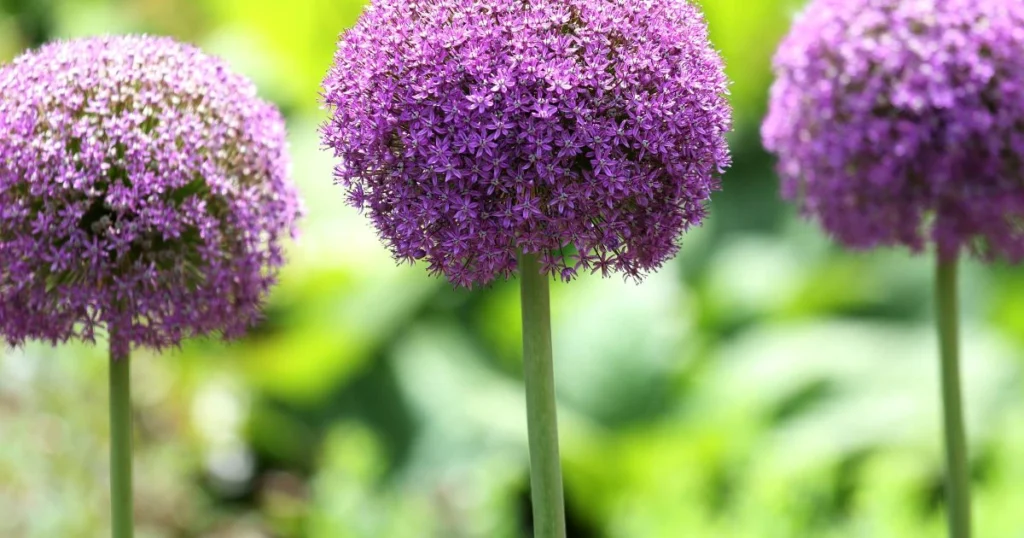
2. Alpine Betony
Plant Type: Perennial
Geographic Origin: Europe, especially alpine regions
Plant Size: 12-18 inches tall
Sun Exposure: Full sun to partial shade
Description: Alpine Betony is loved for its dense, violet flower spikes that bring texture and elegance to rock gardens or borders. The soft foliage complements its blossoms beautifully.
Growing Tips: Ensure well-drained soil with moderate moisture. Remove faded blooms to promote ongoing flowering.
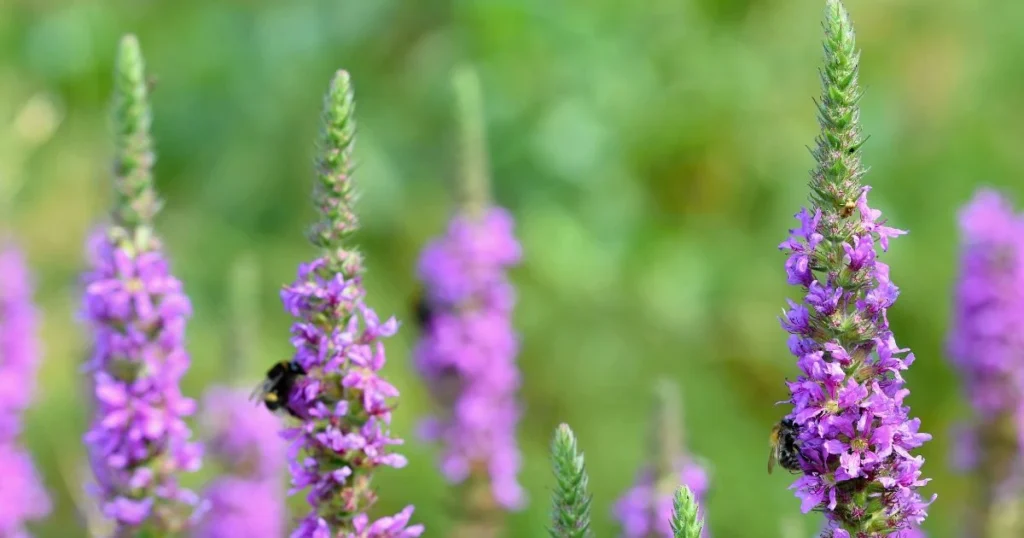
3. Anemone
Plant Type: Perennial
Geographic Origin: Europe, Asia, North America
Plant Size: 1-3 feet tall
Sun Exposure: Partial shade
Description: Known for its elegant, cup-shaped blooms, the Anemone comes in various shades of purple, adding grace to gardens in late summer or fall.
Growing Tips: Plant in rich, moist soil with good drainage. Mulch around the base to retain soil moisture and protect roots in colder zones.
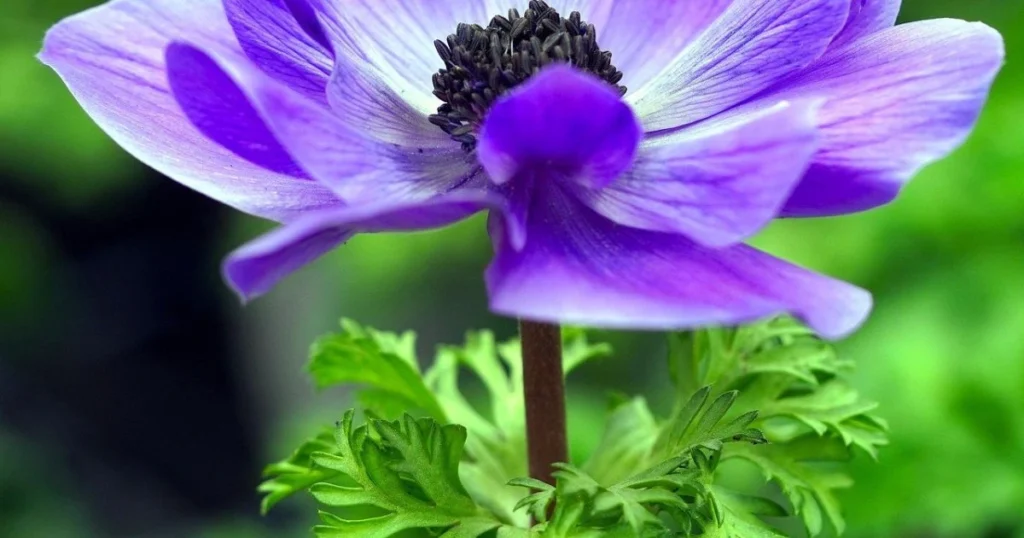
4. Anise Hyssop
Plant Type: Perennial
Geographic Origin: North America
Plant Size: 2-4 feet tall
Sun Exposure: Full sun
Description: This aromatic plant features fragrant purple spikes and a sweet licorice scent, making it a favorite for pollinators and gardeners alike.
Growing Tips: Plant in well-drained soil with plenty of sunlight. Water sparingly once established, as it tolerates drought conditions.
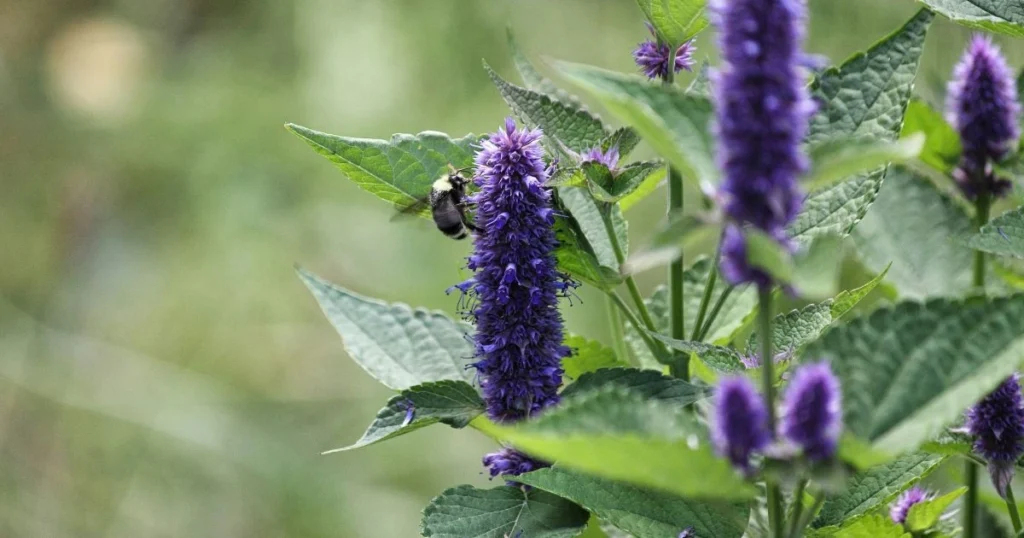
5. Annual Honesty
Plant Type: Biennial
Geographic Origin: Europe
Plant Size: 1-3 feet tall
Sun Exposure: Partial shade
Description: Annual Honesty is known for its delicate purple flowers and unique, translucent, coin-shaped seed pods that remain ornamental long after flowering.
Growing Tips: Plant in moist, well-drained soil. Provide afternoon shade in warmer climates to prevent wilting.
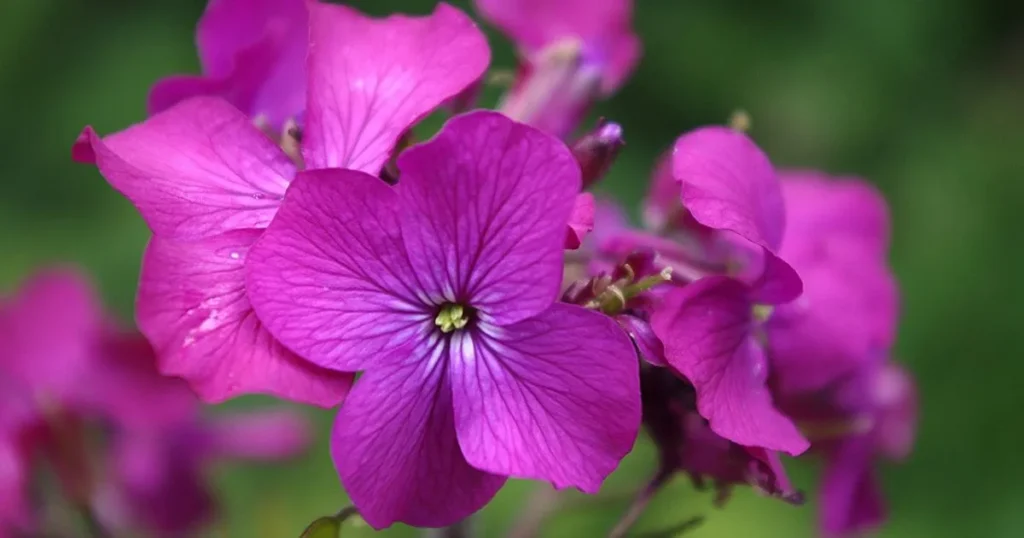
6. Aster
Plant Type: Perennial
Geographic Origin: North America, Eurasia
Plant Size: 1-6 feet tall
Sun Exposure: Full sun
Description: Asters brighten autumn gardens with their daisy-like purple flowers, attracting butterflies and adding a splash of late-season color.
Growing Tips: Plant in well-drained soil with ample sunlight. Regular deadheading will help prolong the blooming period.
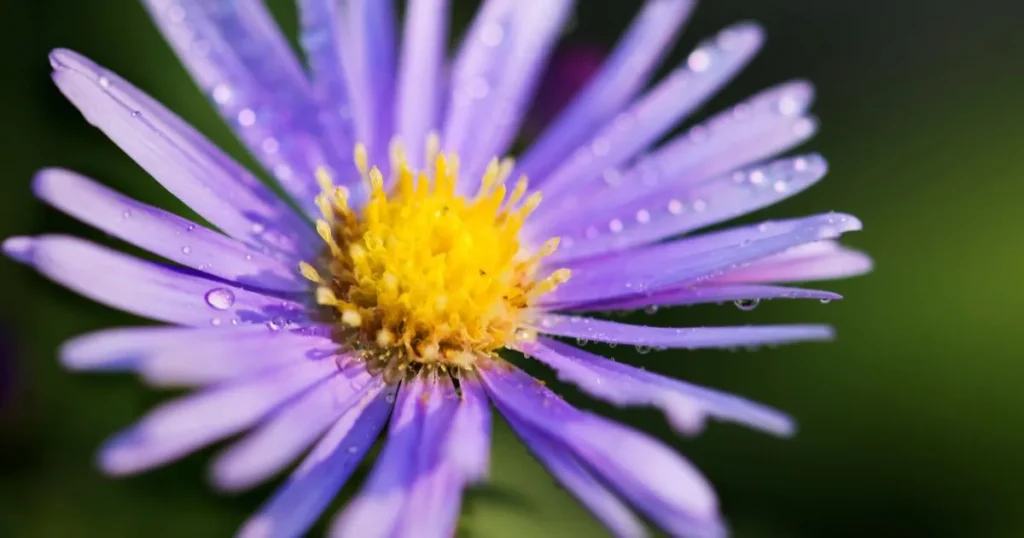
7. Balloon Flower
Plant Type: Perennial
Geographic Origin: East Asia
Plant Size: 1-2 feet tall
Sun Exposure: Full sun to partial shade
Description: Balloon-shaped buds of this plant pop open into striking, star-shaped purple flowers, offering a whimsical touch to gardens.
Growing Tips: Plant in well-drained soil, avoiding overly wet areas. Once established, they require minimal watering.
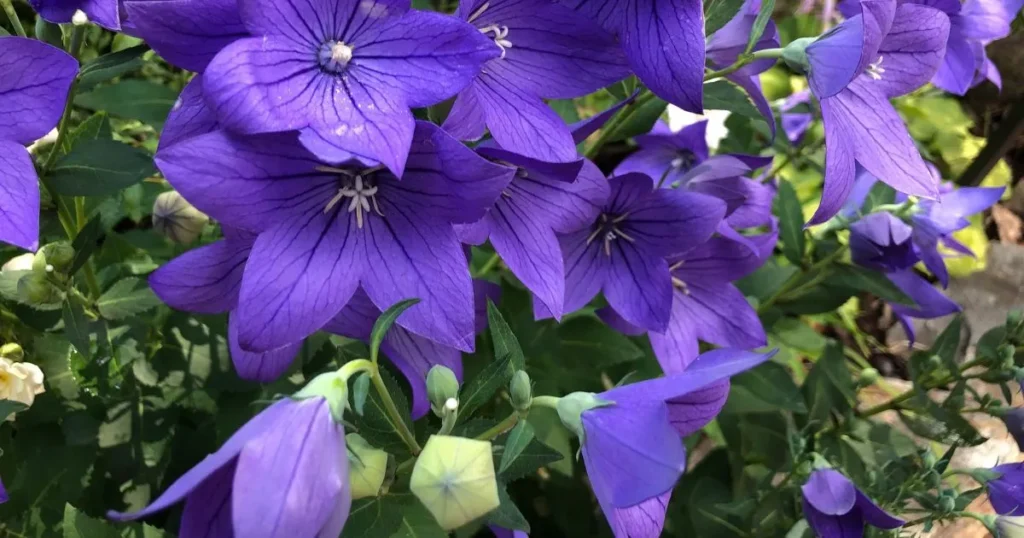
8. Bee Orchid
Plant Type: Perennial
Geographic Origin: Europe
Plant Size: 6-18 inches tall
Sun Exposure: Full sun
Description: The Bee Orchid features purple flowers that mimic the appearance of a bee, making it both intriguing and decorative.
Growing Tips: Plant in dry, sandy soil with excellent drainage. Avoid overwatering and provide plenty of sunlight.
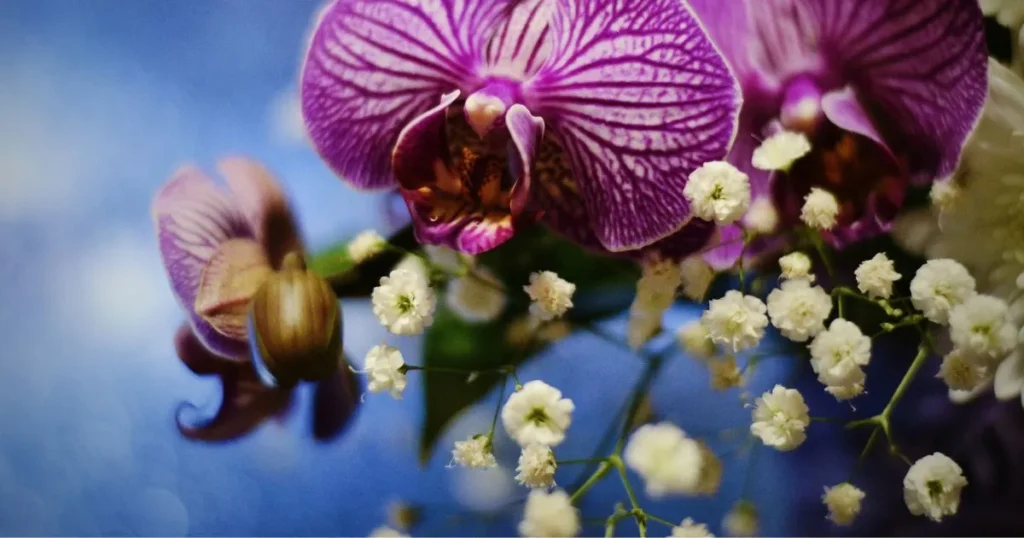
9. Bear’s Breeches
Plant Type: Perennial
Geographic Origin: Mediterranean region
Plant Size: 3-6 feet tall
Sun Exposure: Full sun to partial shade
Description: This bold plant displays tall, spiky purple flowers accented with white, making it a striking focal point in any garden.
Growing Tips: Plant in well-drained soil with moderate watering. It thrives in sunny locations but can tolerate light shade.
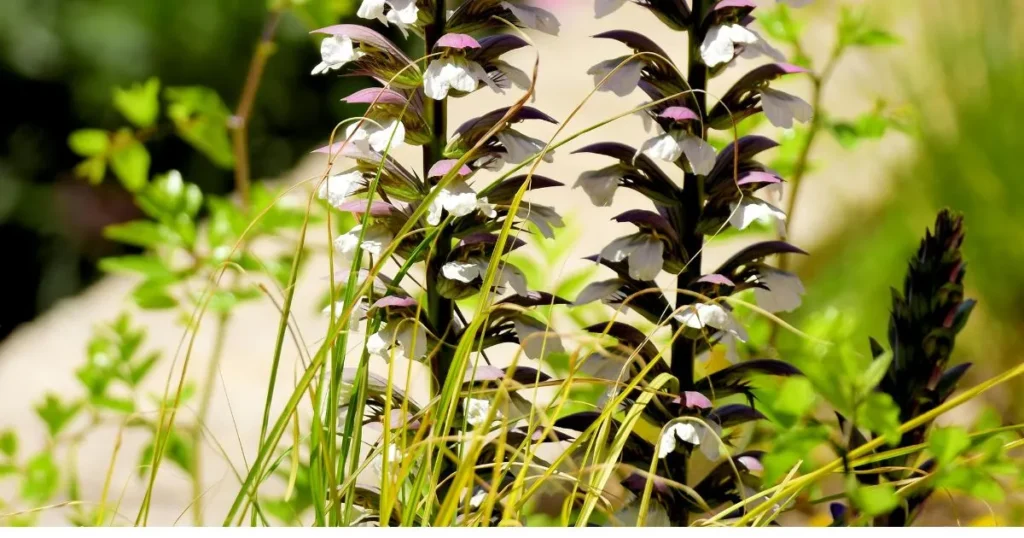
10. Bell Flowers
Plant Type: Perennial
Geographic Origin: Europe, North America, Asia
Plant Size: 1-3 feet tall
Sun Exposure: Partial to full sun
Description: Bell-shaped purple flowers bloom in clusters, adding a delicate charm to gardens, borders, or containers.
Growing Tips: Plant in moist, well-drained soil. Water regularly, but avoid soggy conditions to prevent root rot.
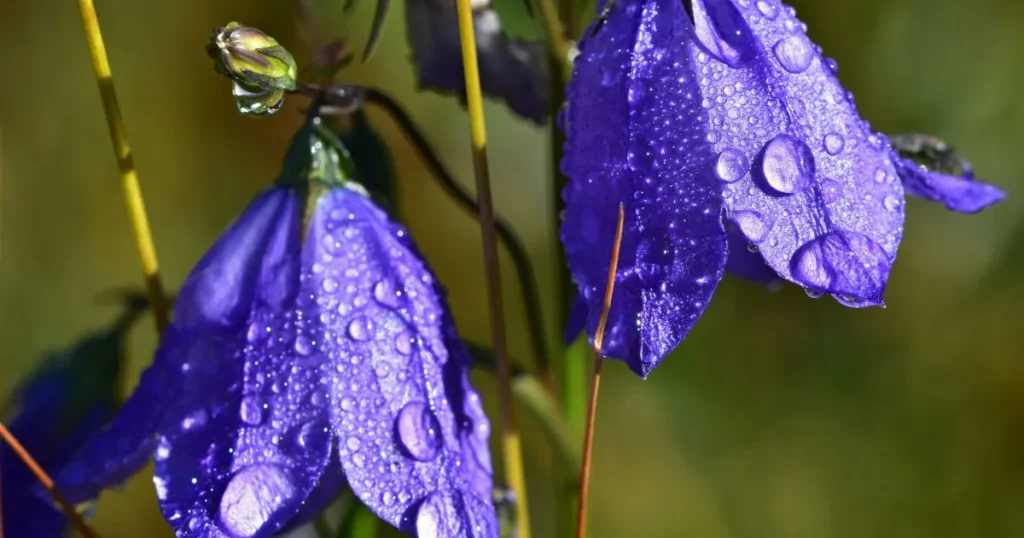
11. Bell Heather
Plant Type: Perennial
Geographic Origin: Europe
Plant Size: 6-24 inches tall
Sun Exposure: Full sun
Description: Bell Heather boasts clusters of small, bell-shaped flowers in rich shades of purple, adding vibrant color to rocky or sandy soils.
Growing Tips: Thrives in acidic, well-drained soil with plenty of sunlight. Avoid overwatering to prevent root rot.
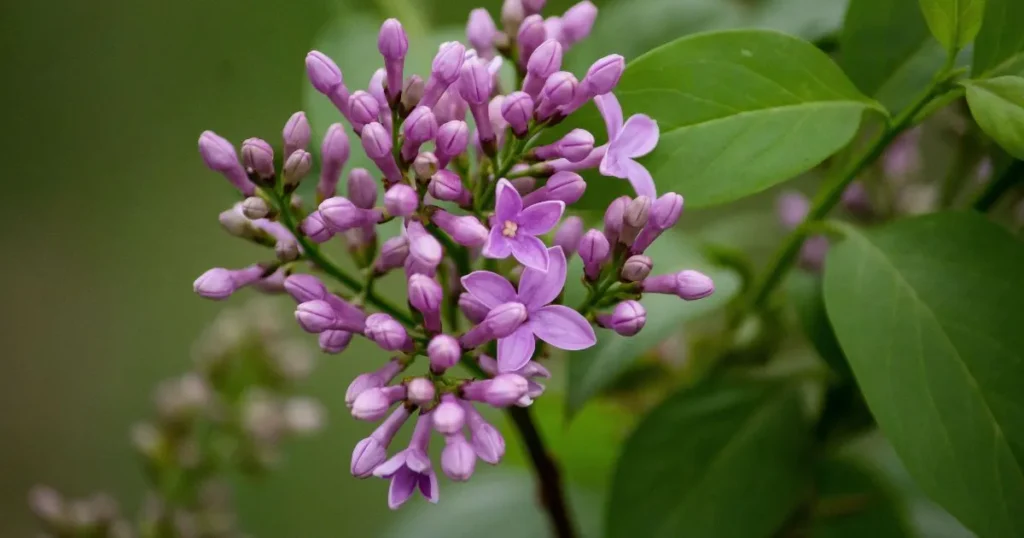
12. Bittersweet Nightshade
Plant Type: Perennial
Geographic Origin: Europe and Asia
Plant Size: 2-10 feet tall (vine)
Sun Exposure: Partial sun
Description: Featuring star-shaped purple flowers with striking yellow centers, Bittersweet Nightshade brings an exotic touch to trellises or fences.
Growing Tips: Plant in well-drained soil with partial sunlight. Prune regularly to control its growth.
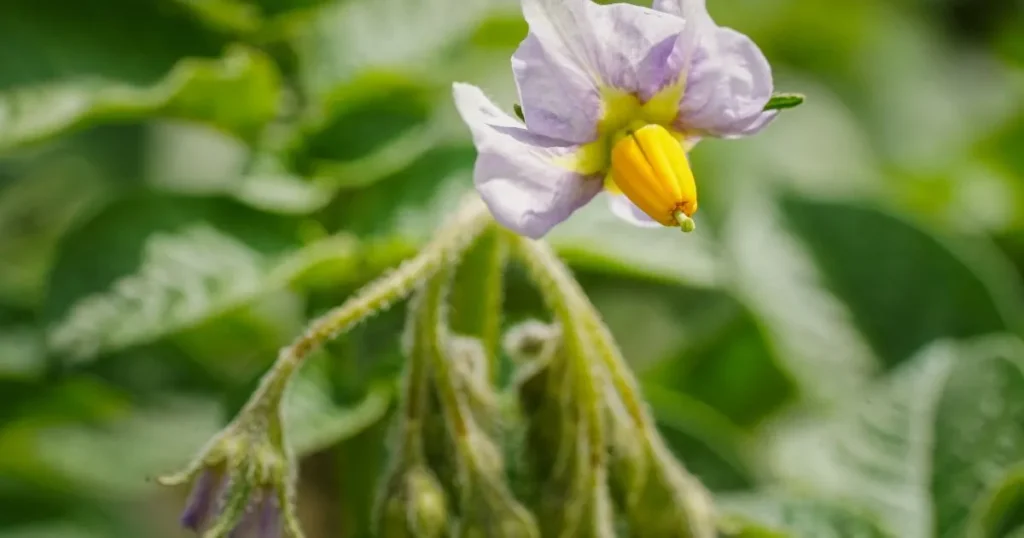
13. Black Adder Giant Hyssop
Plant Type: Perennial
Geographic Origin: North America
Plant Size: 2-4 feet tall
Sun Exposure: Full sun
Description: Known for its spiky, purple flower clusters, Black Adder Giant Hyssop attracts bees, butterflies, and hummingbirds, adding life to your garden.
Growing Tips: Prefers well-drained soil and consistent sunlight. Once established, it requires minimal watering.
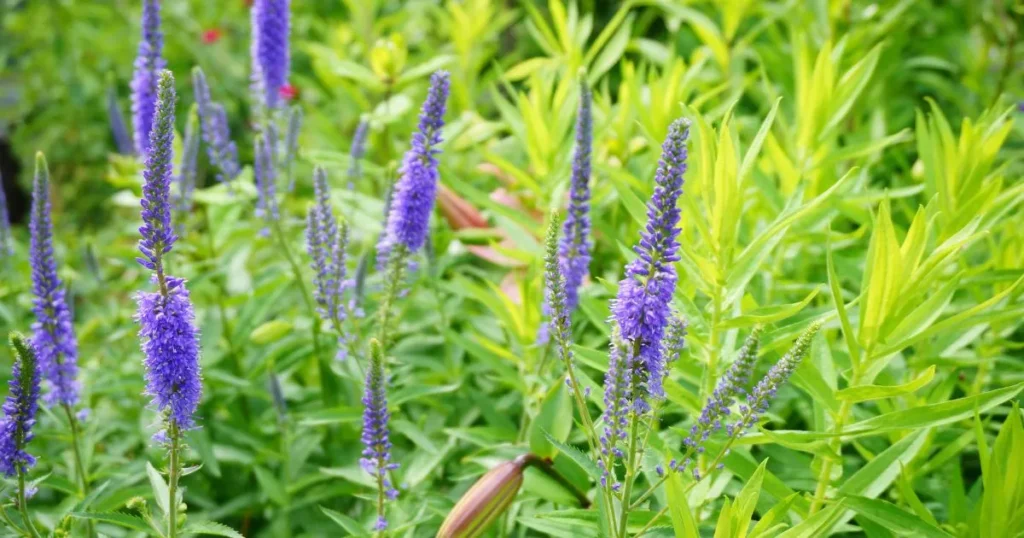
14. Blackcurrant Swirl Moonflower
Plant Type: Annual
Geographic Origin: South America
Plant Size: 5-15 feet tall (vine)
Sun Exposure: Full sun
Description: This striking plant produces vibrant purple flowers adorned with a rich, dark swirl pattern, perfect for trellises and arbors.
Growing Tips: Ensure well-drained soil and consistent watering. Provide support for climbing vines.
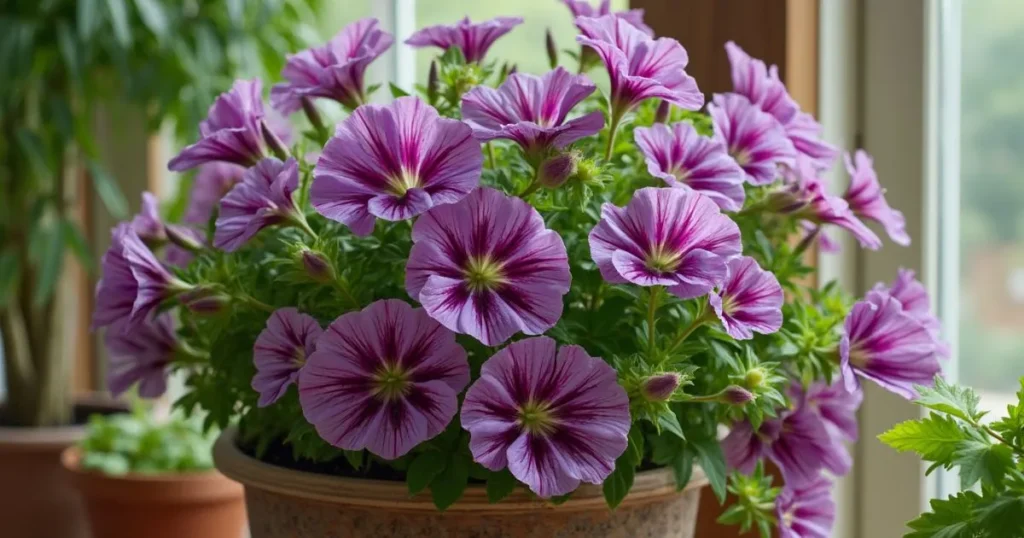
15. Blazing Stars
Plant Type: Perennial
Geographic Origin: North America
Plant Size: 2-5 feet tall
Sun Exposure: Full sun
Description: Blazing Stars display tall, spiky purple blooms that resemble stars, creating a dramatic vertical element in gardens.
Growing Tips: Plant in well-drained soil and water sparingly, as these plants tolerate drought well.
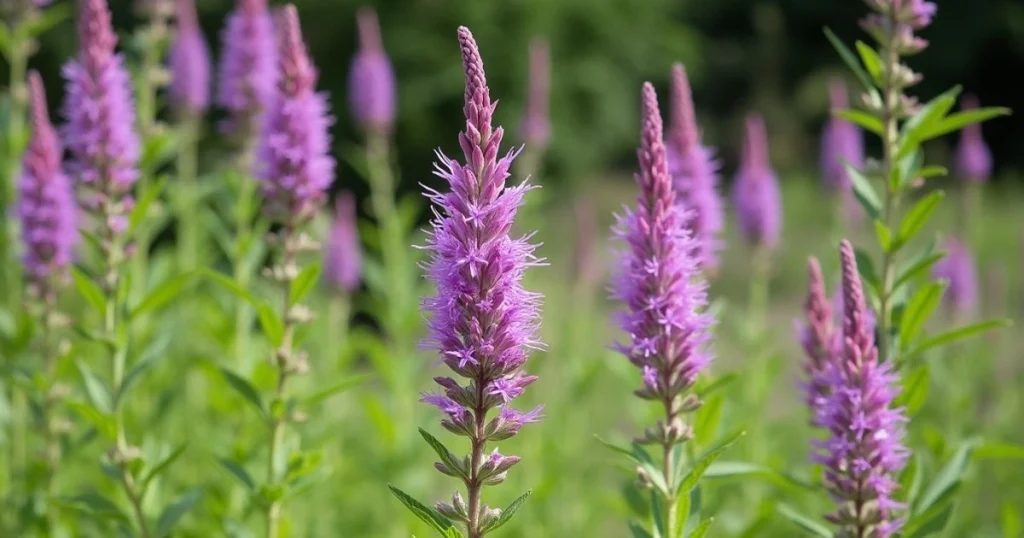
16. Blue False Indigo
Plant Type: Perennial
Geographic Origin: North America
Plant Size: 3-4 feet tall
Sun Exposure: Full sun
Description: Blue False Indigo features tall, pea-shaped purple flowers that add elegance and texture to gardens or borders.
Growing Tips: Thrives in well-drained soil. It is low-maintenance and deer-resistant, making it a durable choice for gardeners.
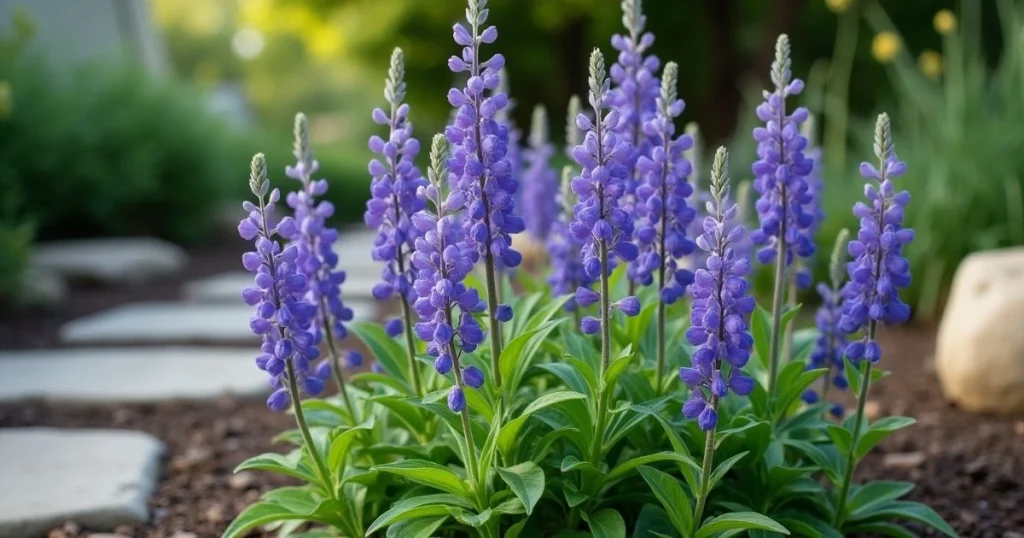
17. Blue-Eyed Grass
Plant Type: Perennial
Geographic Origin: North and Central America
Plant Size: 6-20 inches tall
Sun Exposure: Full sun
Description: Delicate, grass-like foliage is adorned with blue-purple flowers that have a bright yellow center, perfect for softening garden edges.
Growing Tips: Prefers moist, well-drained soil. Consistent watering supports its vibrant growth.
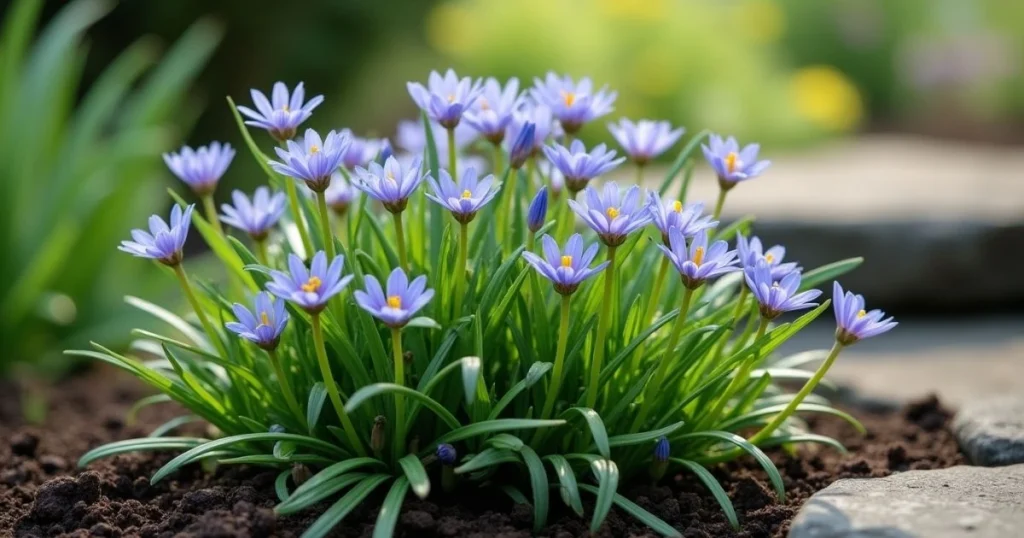
18. Bougainvillea
Plant Type: Perennial (in warm climates)
Geographic Origin: South America
Plant Size: 3-40 feet tall (depending on variety)
Sun Exposure: Full sun
Description: Bougainvillea’s vibrant purple bracts surround its small, true flowers, creating a showy display ideal for walls, fences, or trellises.
Growing Tips: Ensure well-drained soil and consistent sunlight. Let the soil dry out a bit before watering again.
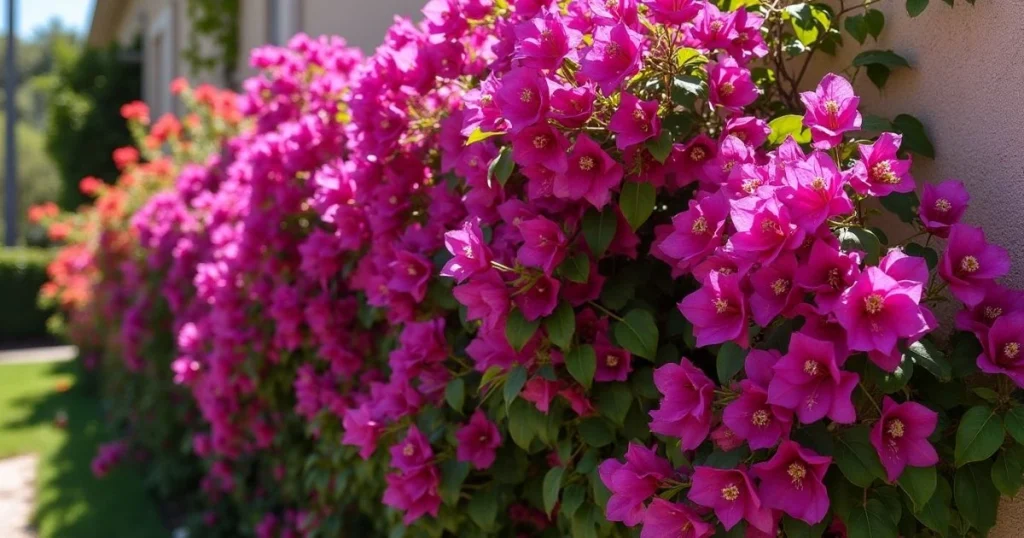
19. Browallia
Plant Type: Annual
Geographic Origin: South America
Plant Size: 6-18 inches tall
Sun Exposure: Partial to full sun
Description: Browallia produces small, bell-shaped purple flowers with a white center, adding a dainty charm to containers or garden beds.
Growing Tips: Prefers well-drained soil and moderate watering. Limit exposure to harsh afternoon sunlight.
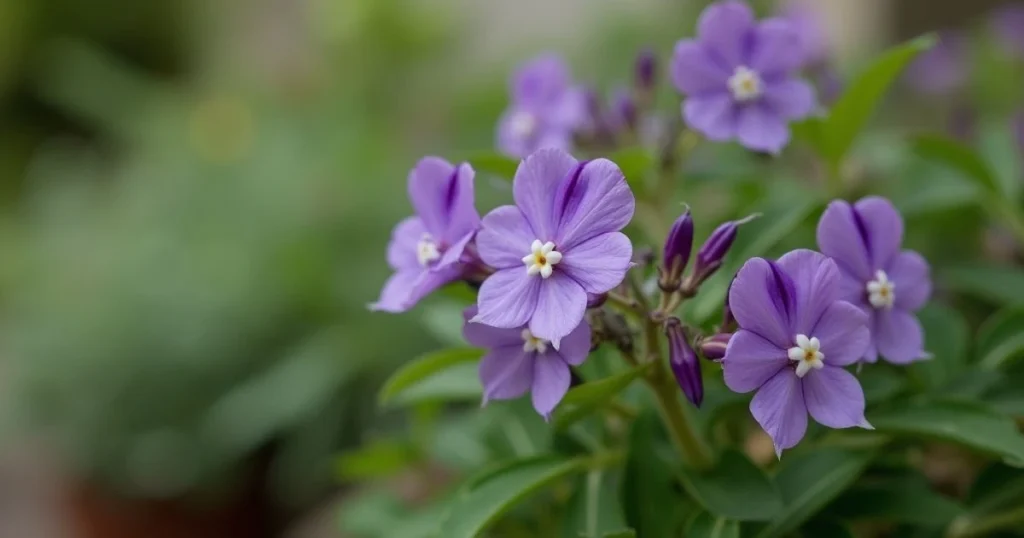
20. Butterfly Bush
Plant Type: Perennial
Geographic Origin: Asia
Plant Size: 3-12 feet tall
Sun Exposure: Full sun
Description: Clusters of purple flowers on the Butterfly Bush are a magnet for butterflies, making it a lively addition to any garden.
Growing Tips: Plant in well-drained soil and prune annually to maintain its shape and encourage blooming.

21. Calla Lily
Plant Type: Perennial
Geographic Origin: South Africa
Plant Size: 1-3 feet tall
Sun Exposure: Full sun to partial shade
Description: Calla Lilies are known for their elegant, trumpet-shaped flowers that come in a range of purple shades, adding sophistication to any garden.
Growing Tips: Plant in moist, well-drained soil. Water regularly but avoid waterlogging to maintain healthy blooms.
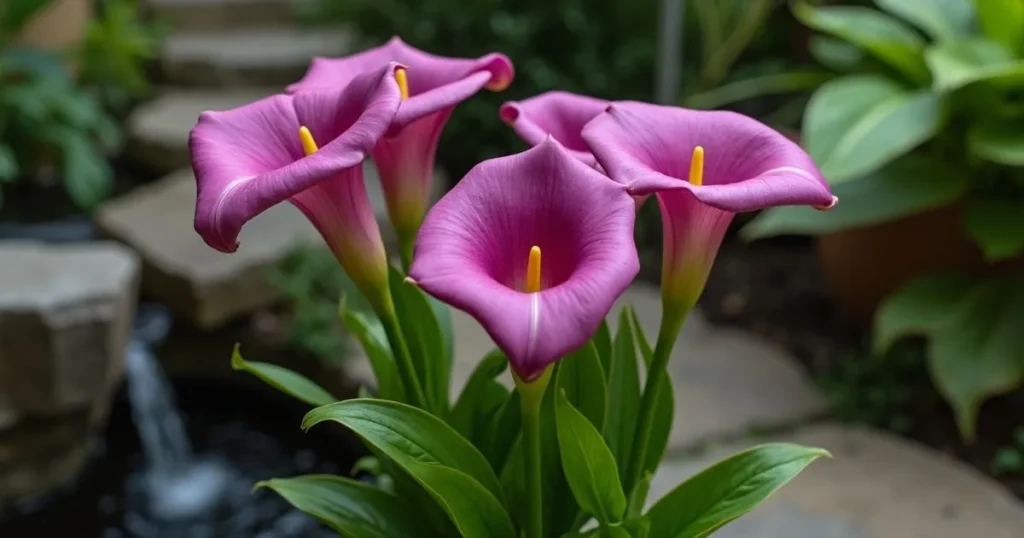
22. Camas Lily
Plant Type: Perennial
Geographic Origin: North America
Plant Size: 1-3 feet tall
Sun Exposure: Full sun
Description: Camas Lilies feature tall spikes adorned with star-shaped purple flowers, perfect for naturalizing in meadows or gardens.
Growing Tips: Thrives in moist, well-drained soil. Plant bulbs in the fall for a beautiful spring display.
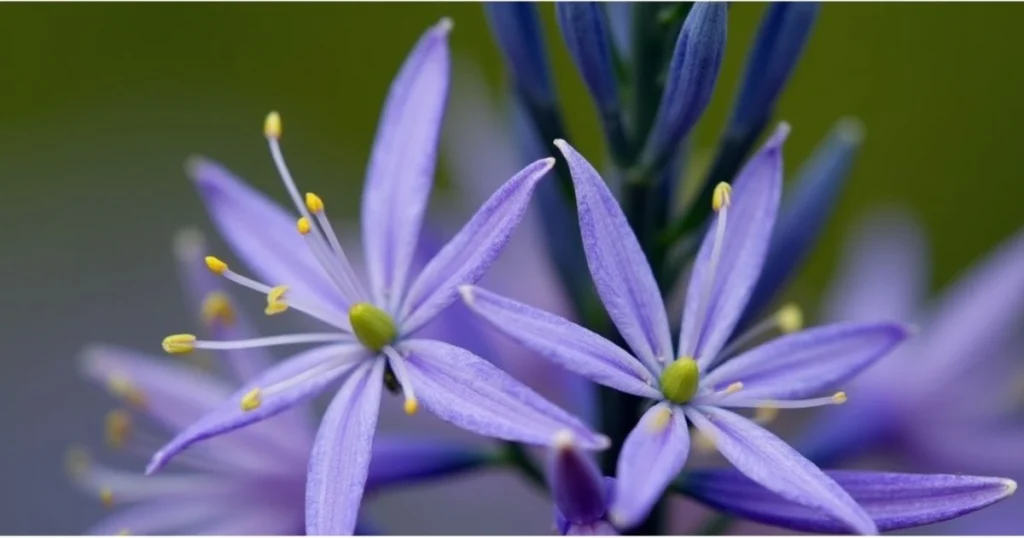
23. Candytuft
Plant Type: Perennial
Geographic Origin: Europe
Plant Size: 6-12 inches tall
Sun Exposure: Full sun
Description: This low-growing plant forms clusters of small purple blooms that create a carpet of color, ideal for borders or rock gardens.
Growing Tips: Prefers well-drained soil. Remove spent flowers regularly to ensure continuous blooming.
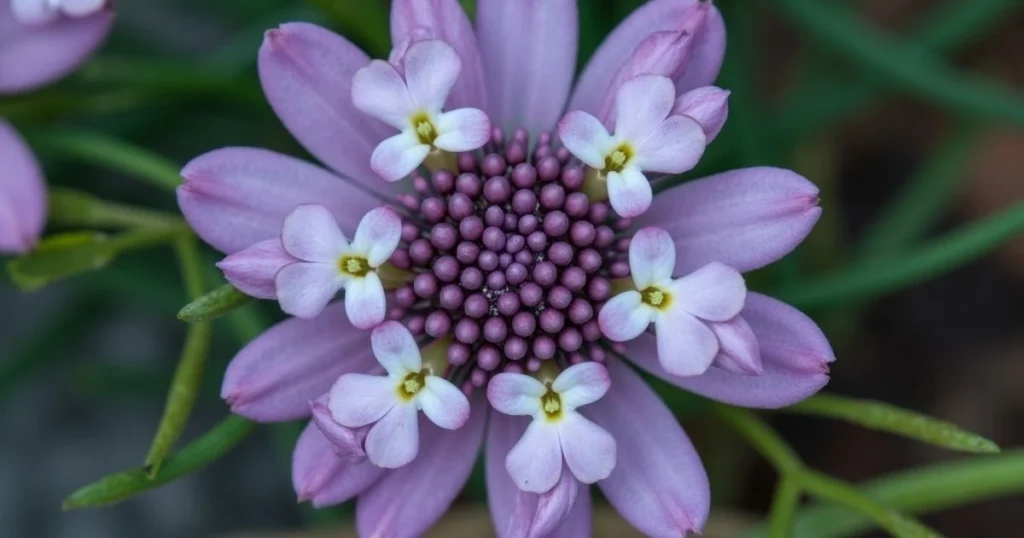
24. Canterbury Bells
Plant Type: Biennial
Geographic Origin: Europe
Plant Size: 2-3 feet tall
Sun Exposure: Full sun
Description: Canterbury Bells produce stunning, bell-shaped purple flowers that bring a classic charm to cottage gardens.
Growing Tips: Plant in well-drained soil and stake tall stems to prevent bending.
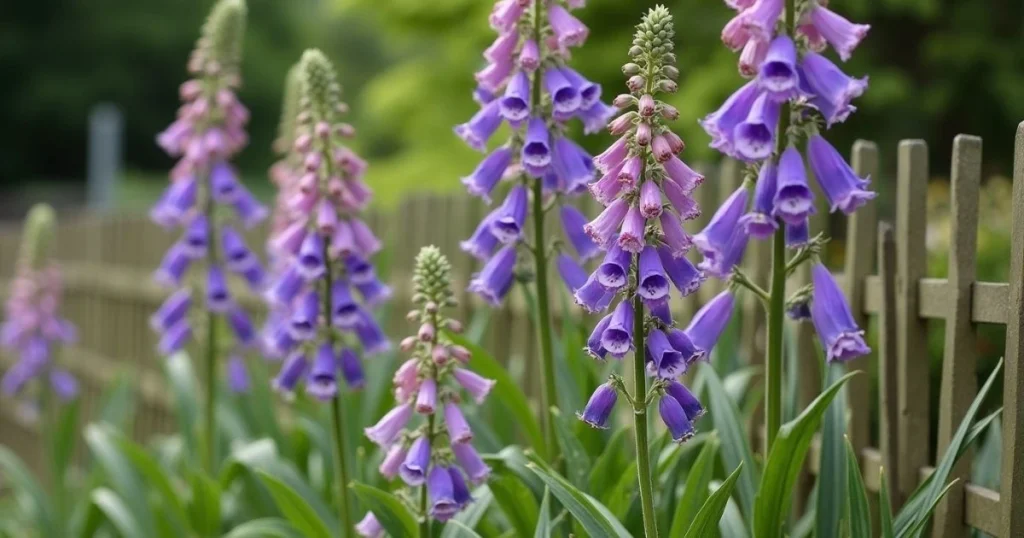
25. Carnation
Plant Type: Perennial
Geographic Origin: Europe and Asia
Plant Size: 12-24 inches tall
Sun Exposure: Full sun
Description: With their fragrant and ruffled petals, Carnations add texture and a splash of purple to flower arrangements and gardens.
Growing Tips: Ensure well-drained soil and space plants for good air circulation to prevent disease.
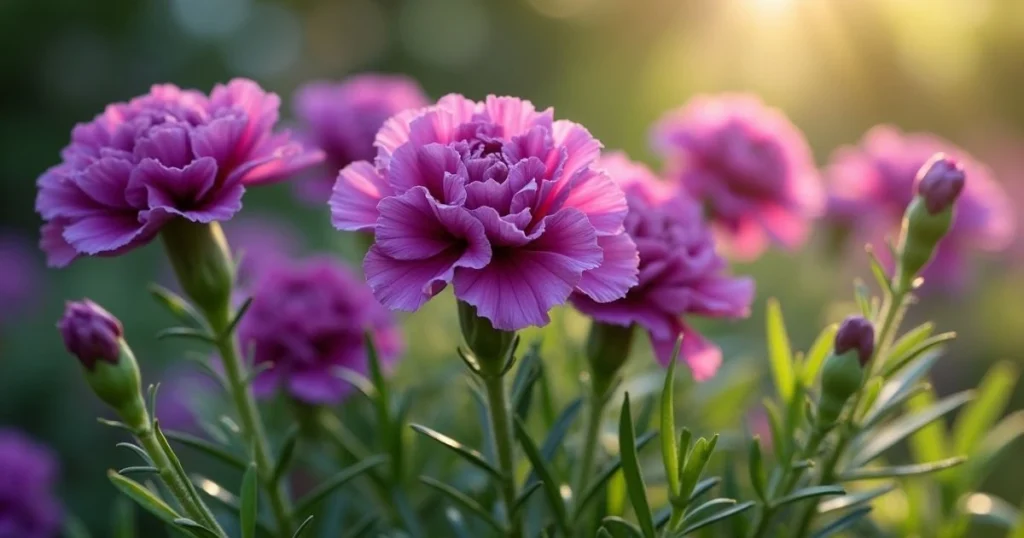
26. Catmint
Plant Type: Perennial
Geographic Origin: Asia and Europe
Plant Size: 12-36 inches tall
Sun Exposure: Full sun
Description: Catmint features aromatic, spike-like clusters of purple flowers that attract pollinators and add a soft fragrance to gardens.
Growing Tips: Grows well in well-drained soil. Trim after the first bloom to promote a second round of flowers.
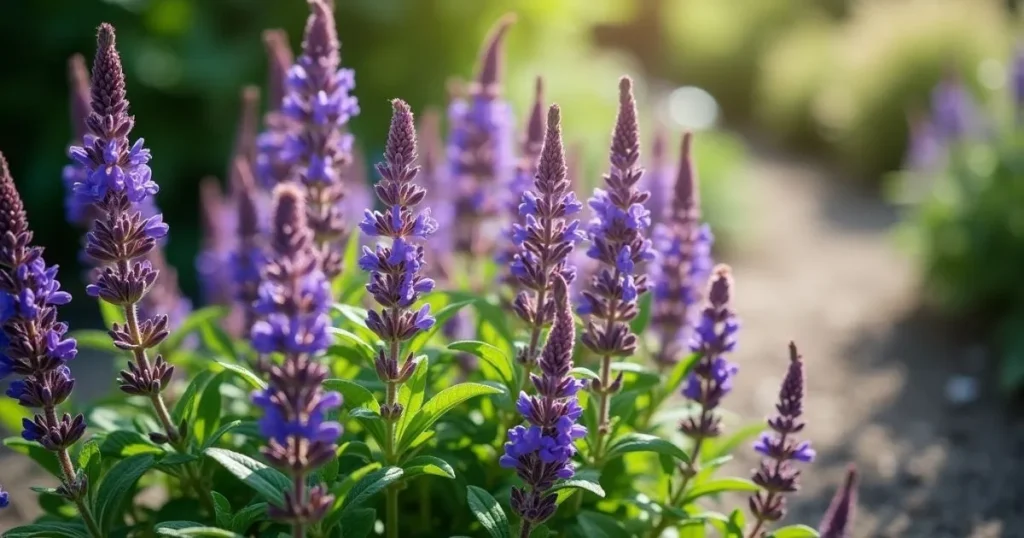
27. Cattleya Orchids
Plant Type: Perennial
Geographic Origin: Central and South America
Plant Size: 1-2 feet tall
Sun Exposure: Indirect light
Description: Known for their large, colorful blooms, including shades of purple, Cattleya Orchids are a showstopper in any indoor garden.
Growing Tips: Keep soil moist but not soggy. Place in bright, indirect light to avoid scorching the leaves.
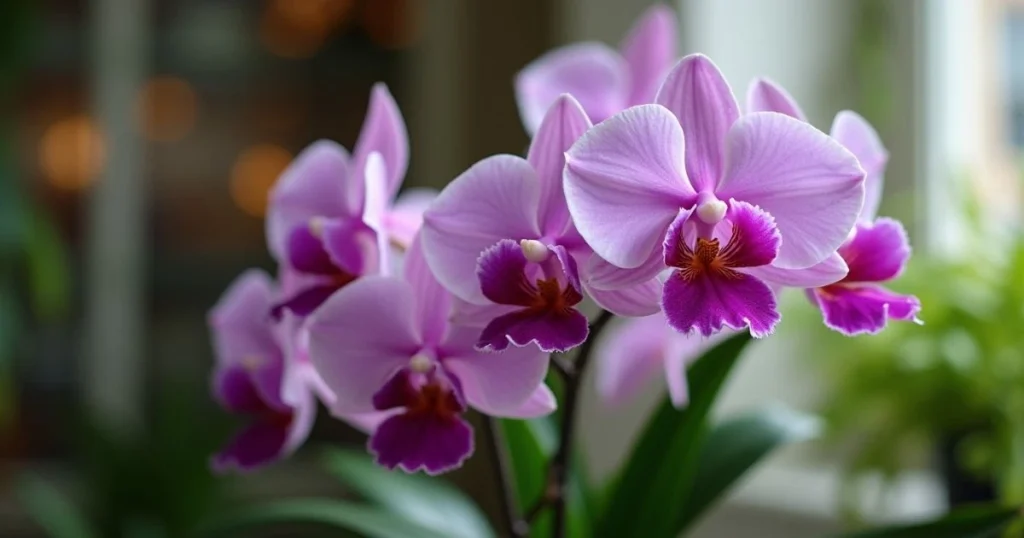
28. Cheeses (Common Mallow)
Plant Type: Perennial
Geographic Origin: Europe and Asia
Plant Size: 2-4 feet tall
Sun Exposure: Full sun
Description: Common Mallow produces lavender-pink flowers tinged with purple, adding a wildflower vibe to gardens.
Growing Tips: Plant in well-drained soil and allow for plenty of sunlight to ensure vibrant blooms.

29. China Aster
Plant Type: Annual
Geographic Origin: Asia
Plant Size: 12-36 inches tall
Sun Exposure: Full sun
Description: China Asters produce dainty purple flowers that bloom from late summer to fall, offering long-lasting color.
Growing Tips: Plant in well-drained soil and deadhead regularly to prolong the blooming period.
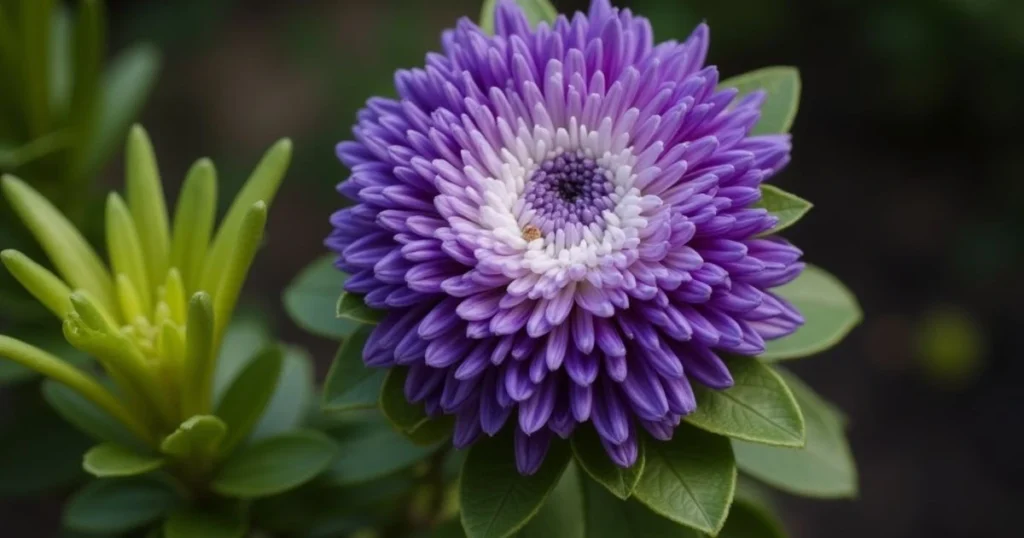
30. Chinese Wisteria
Plant Type: Perennial
Geographic Origin: China
Plant Size: 10-30 feet tall (vine)
Sun Exposure: Full sun
Description: Chinese Wisteria is known for its cascading clusters of fragrant purple flowers that bring elegance to trellises and pergolas.
Growing Tips: Ensure well-drained soil and prune after flowering to maintain shape and promote growth.
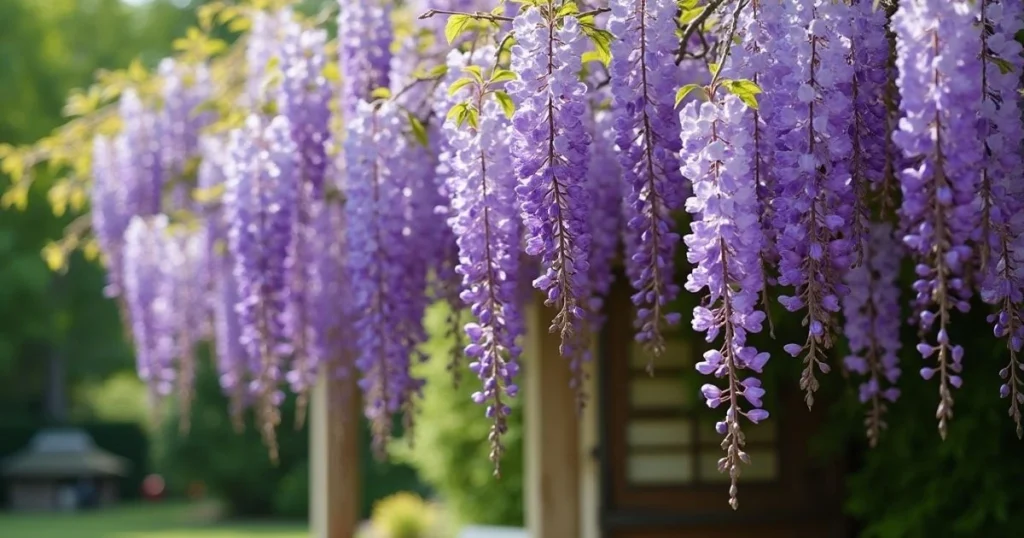
31. Clematis
Plant Type: Deciduous Vine
Geographic Origin: Europe, Asia, North America
Plant Size: 6-12 feet tall
Sun Exposure: Partial sun
Description: Clematis vines are known for their striking, star-like purple flowers that add vertical interest to gardens and trellises.
Growing Tips: Prefers well-drained soil. For best blooms, plant in partial sun and provide support for the climbing vines.
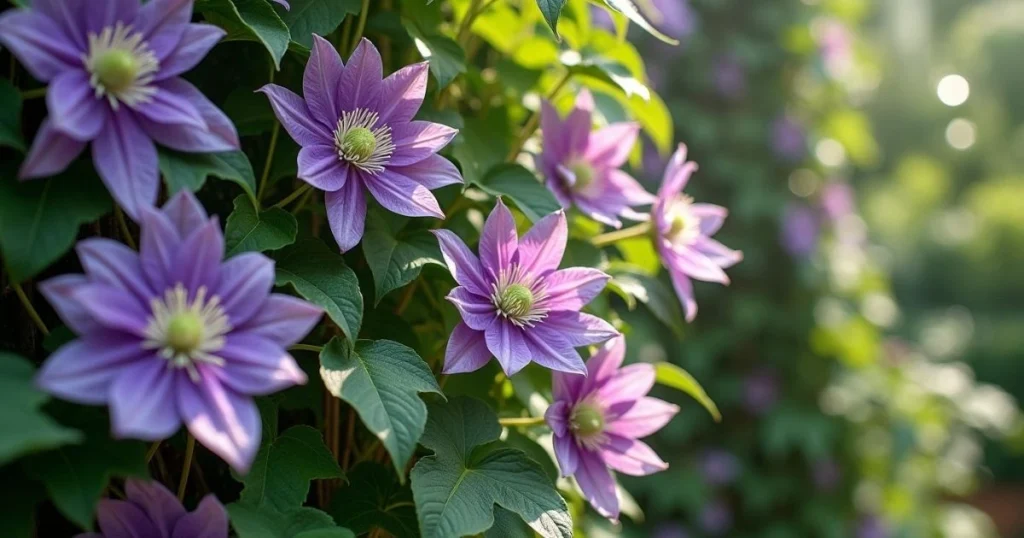
32. Columbine
Plant Type: Perennial
Geographic Origin: North America
Plant Size: 1-3 feet tall
Sun Exposure: Partial shade
Description: Columbine flowers are bell-shaped with spurs, often displaying a delicate purple hue that makes them a favorite in shaded gardens.
Growing Tips: Prefers moist, well-drained soil. Regular watering will help these lovely flowers thrive, especially in shaded areas.
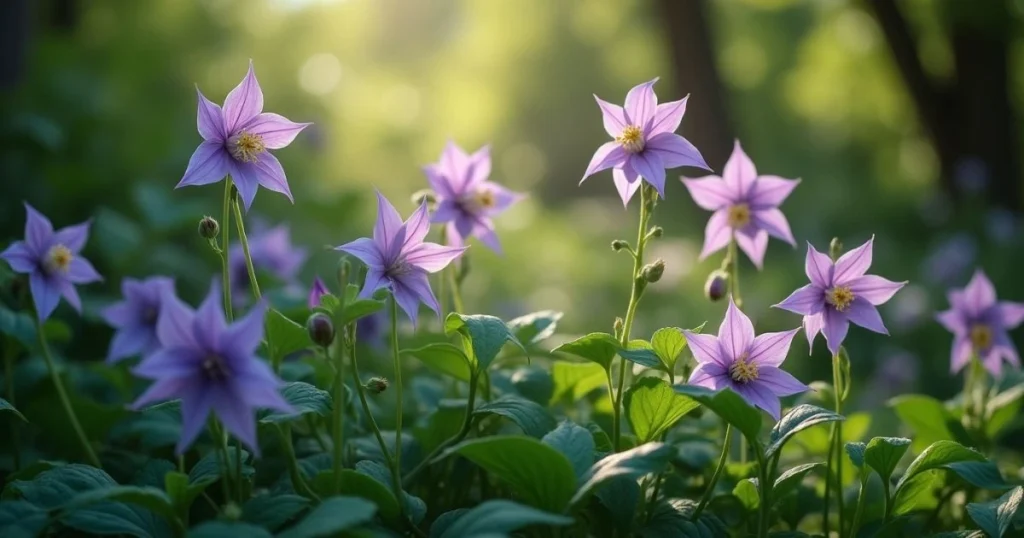
33. Common Comfrey
Plant Type: Perennial
Geographic Origin: Europe
Plant Size: 2-4 feet tall
Sun Exposure: Full sun
Description: Common Comfrey produces clusters of bell-shaped purple flowers, perfect for attracting pollinators and adding color to herb gardens.
Growing Tips: Thrives in well-drained soil. This hardy plant enjoys full sun and can spread, so ensure enough space for growth.
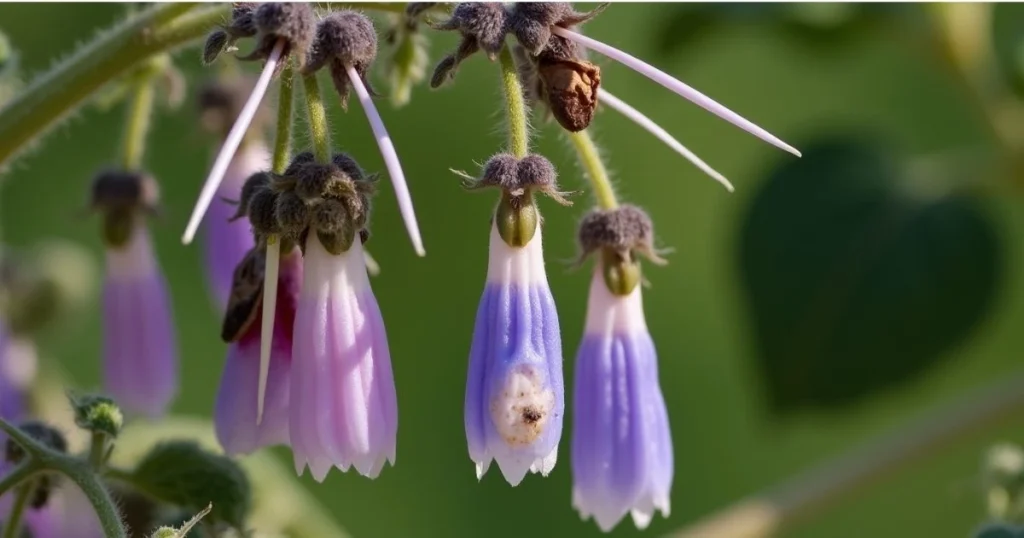
34. Coneflower
Plant Type: Perennial
Geographic Origin: North America
Plant Size: 2-5 feet tall
Sun Exposure: Full sun
Description: Coneflowers feature vibrant purple, daisy-like blooms with a distinct central cone, attracting bees and butterflies.
Growing Tips: Prefers well-drained soil and full sun. Cut back spent flowers to promote further blooming and prevent disease.
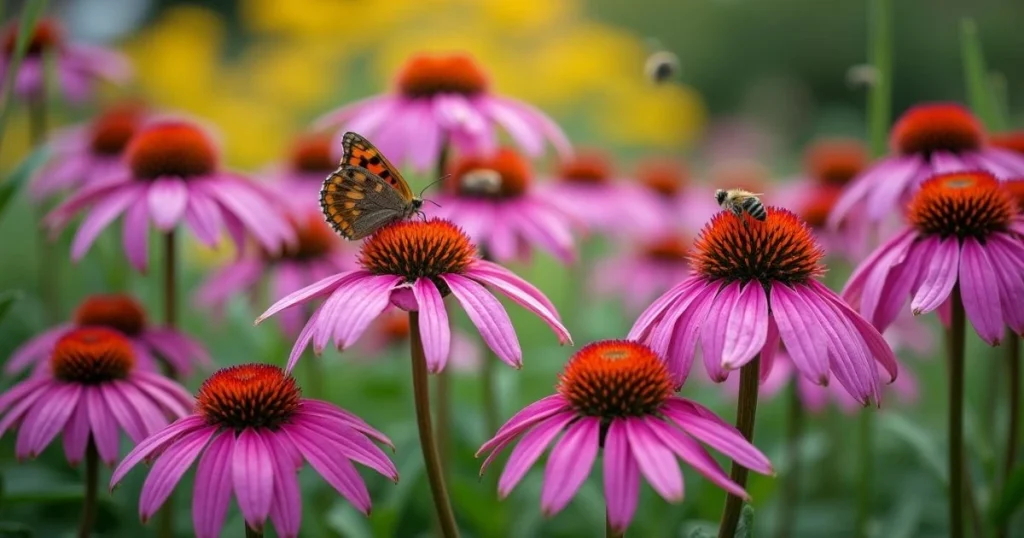
35. Corydalis
Plant Type: Perennial
Geographic Origin: Asia, Europe
Plant Size: 6-12 inches tall
Sun Exposure: Partial shade
Description: Corydalis plants showcase small, tubular purple flowers, often growing in dense clusters, adding texture and color to shaded areas.
Growing Tips: Prefers well-drained soil in partial shade. Keep soil moist but not soggy, especially in warmer months.
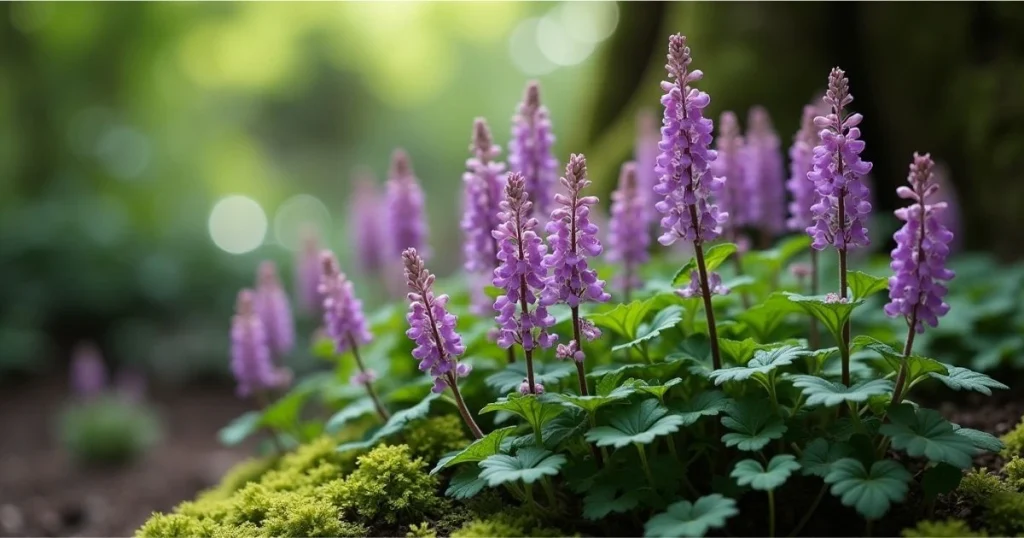
36. Crocus
Plant Type: Perennial
Geographic Origin: Europe, Asia
Plant Size: 3-6 inches tall
Sun Exposure: Full sun
Description: Crocus flowers bloom early in spring, presenting small, cup-shaped purple flowers that signal the season’s change.
Growing Tips: Thrives in well-drained soil and full sun. Plant bulbs in fall to enjoy a colorful early spring bloom.
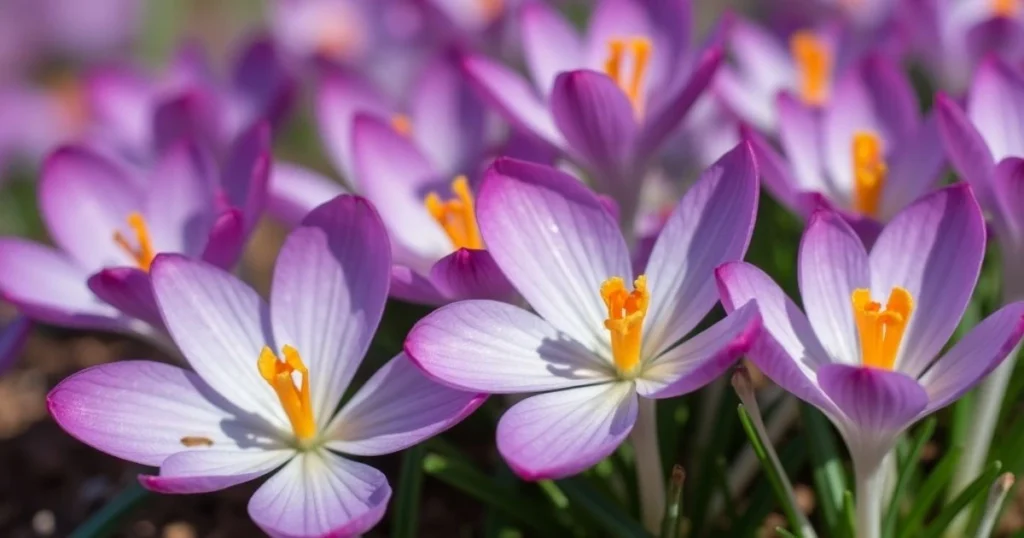
37. Cup-and-Saucer Vine
Plant Type: Vine
Geographic Origin: Central America
Plant Size: 10-20 feet tall
Sun Exposure: Full sun
Description: This vigorous vine produces large, trumpet-shaped purple flowers with flared edges, resembling a cup-and-saucer, and adds dramatic flair to fences or trellises.
Growing Tips: Prefers well-drained soil and full sun. Ensure strong support for the vine to grow and flower profusely.
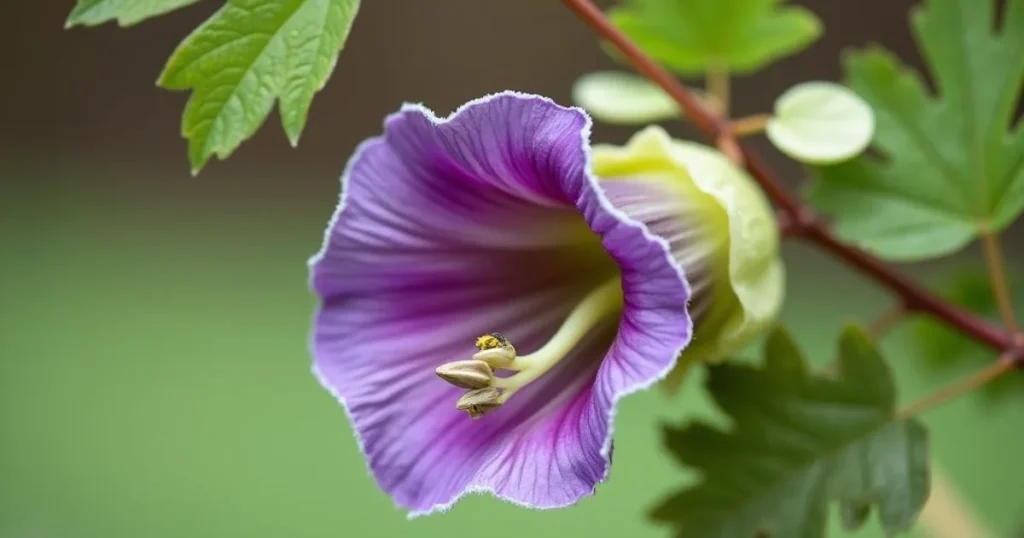
38. Cyclamen
Plant Type: Perennial
Geographic Origin: Europe, Asia
Plant Size: 6-12 inches tall
Sun Exposure: Partial shade
Description: Cyclamen features heart-shaped leaves and delicate purple flowers, making it a favorite for indoor containers and shaded garden spots.
Growing Tips: Prefers well-drained, slightly acidic soil. Keep in partial shade and water carefully to avoid overwatering.
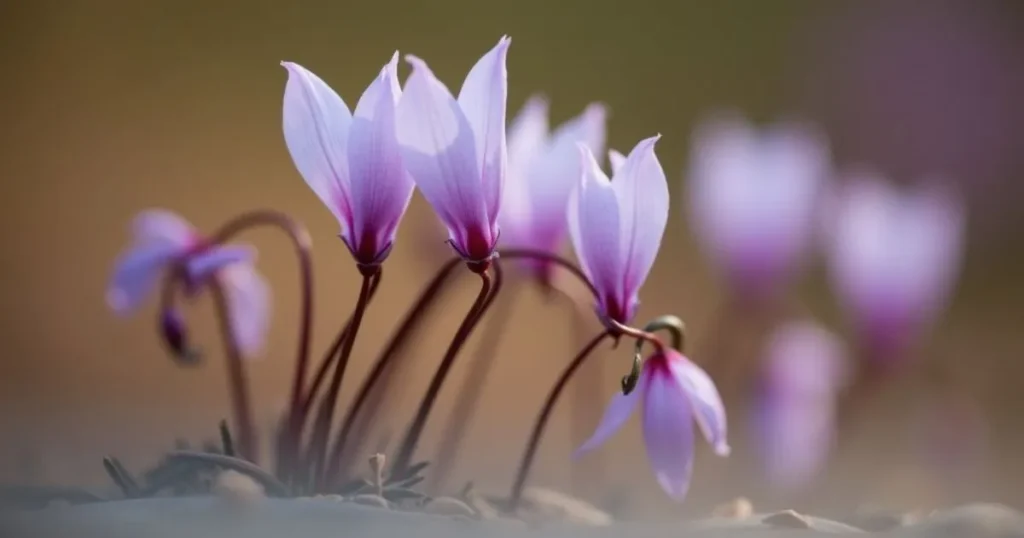
39. Dahlia
Plant Type: Perennial
Geographic Origin: Mexico
Plant Size: 1-5 feet tall
Sun Exposure: Full sun
Description: Dahlias are known for their showy, multi-petaled purple flowers, which bloom continuously from summer to fall, making them a vibrant addition to any garden.
Growing Tips: Prefers moist, well-drained soil. Regularly water and feed for maximum bloom production, especially in sunny spots.
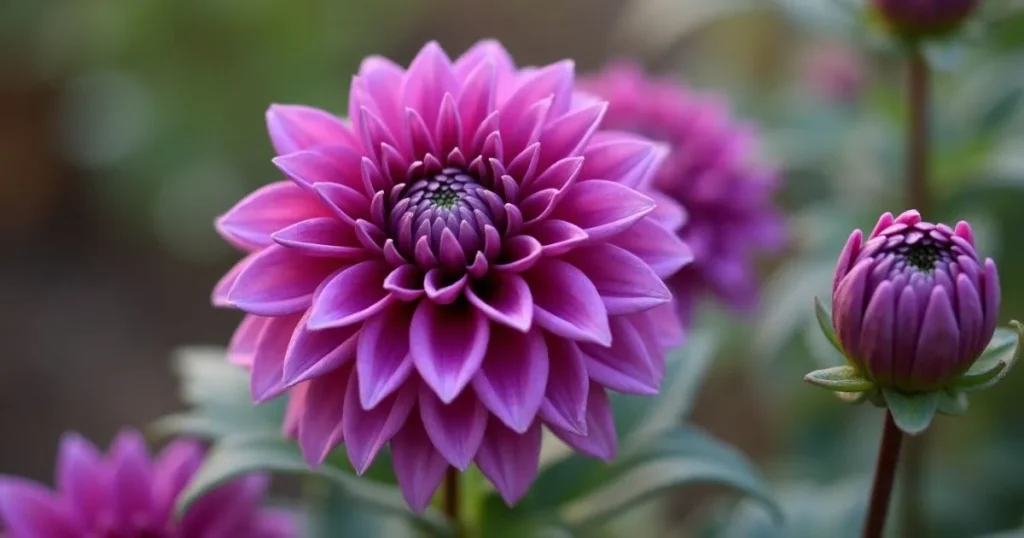
40. Dendrobium Orchid
Plant Type: Epiphytic Orchid
Geographic Origin: Asia, Australia
Plant Size: 1-2 feet tall
Sun Exposure: Indirect light
Description: Dendrobium Orchids have elegant purple flowers with various shapes, adding a sophisticated touch to both indoor and outdoor gardens.
Growing Tips: Prefers indirect light and moist, well-drained soil. Ensure good air circulation and a humid environment for optimal growth.
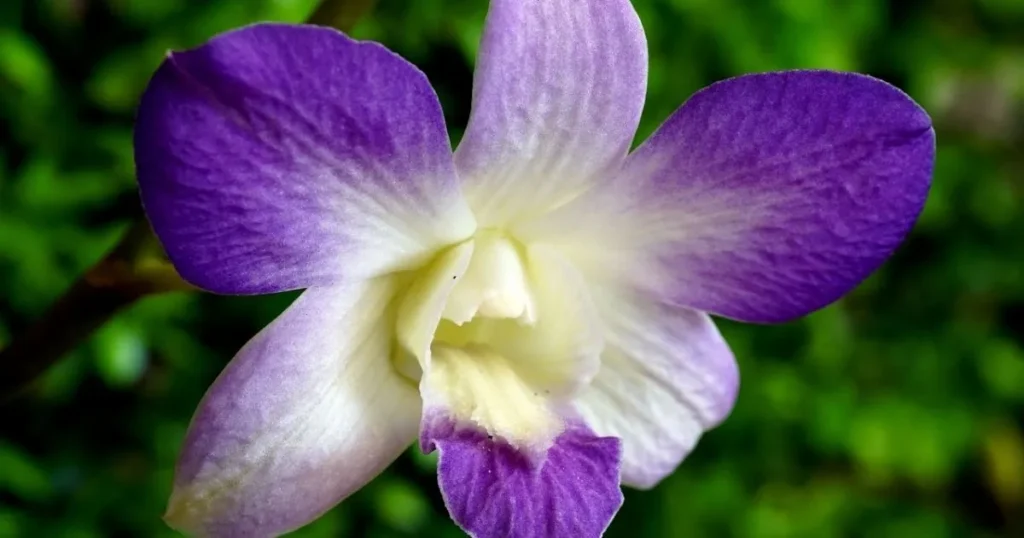
41. Dianthus
Description: Dianthus flowers have fragrant, fringed petals with a spicy scent, often found in shades of purple, and are perfect for adding texture to borders.
Growing Tips: Prefers well-drained soil and full sun. Prune regularly to encourage fresh blooms and maintain a tidy appearance.
Plant Type: Perennial
Geographic Origin: Europe, Asia
Plant Size: 6-12 inches tall
Sun Exposure: Full sun
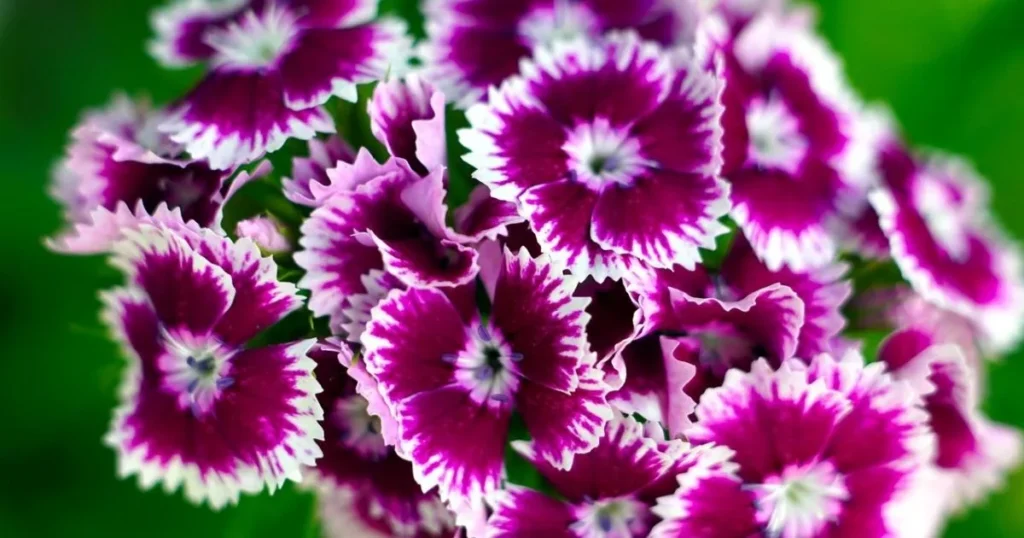
42. Dwarf Iris
Plant Type: Perennial
Geographic Origin: Europe, Asia
Plant Size: 6-10 inches tall
Sun Exposure: Full sun
Description: Dwarf Irises are compact and show off striking purple flowers with delicate petals, adding a pop of color to rock gardens or borders.
Growing Tips: Thrives in well-drained soil and full sun. Plant bulbs in autumn for vibrant blooms in early spring.
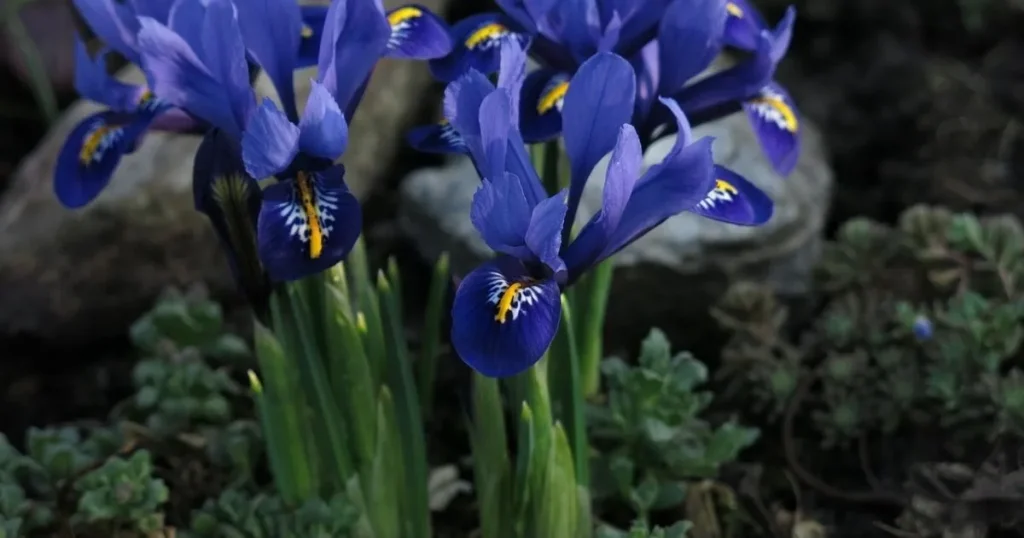
43. Dwarf Rhododendron
Plant Type: Evergreen Shrub
Geographic Origin: Asia, Europe
Plant Size: 1-3 feet tall
Sun Exposure: Partial shade
Description: Dwarf Rhododendrons produce compact clusters of purple flowers, adding vibrant color and structure to shaded garden areas.
Growing Tips: Prefers acidic, well-drained soil. Pruning regularly helps keep its shape and encourages fresh growth.
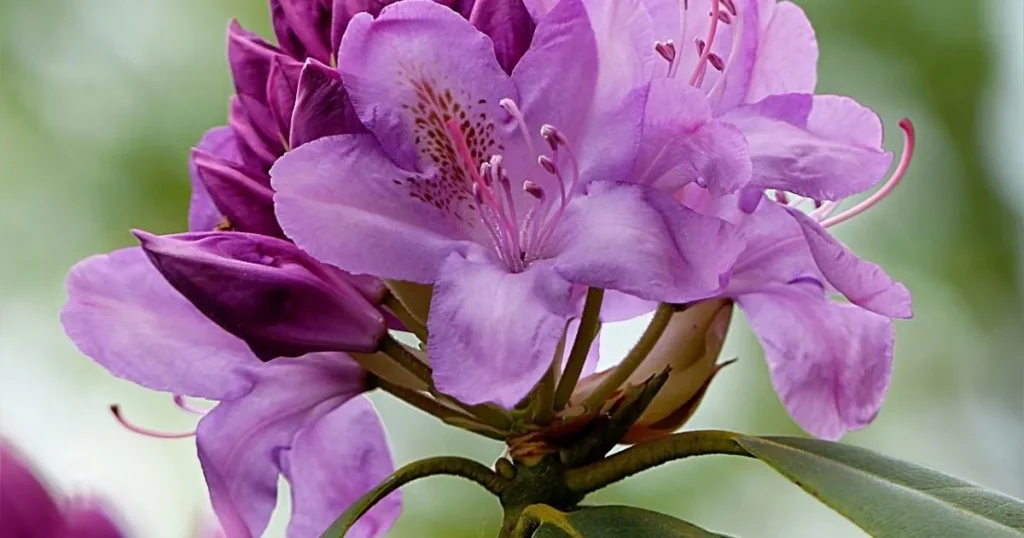
44. European Periwinkle
Plant Type: Perennial
Geographic Origin: Europe
Plant Size: 6-12 inches tall
Sun Exposure: Partial to full sun
Description: European Periwinkles feature small, vibrant purple flowers that spread rapidly, making them ideal for ground cover.
Growing Tips: Prefers well-drained soil and can tolerate a variety of light conditions, from partial shade to full sun.
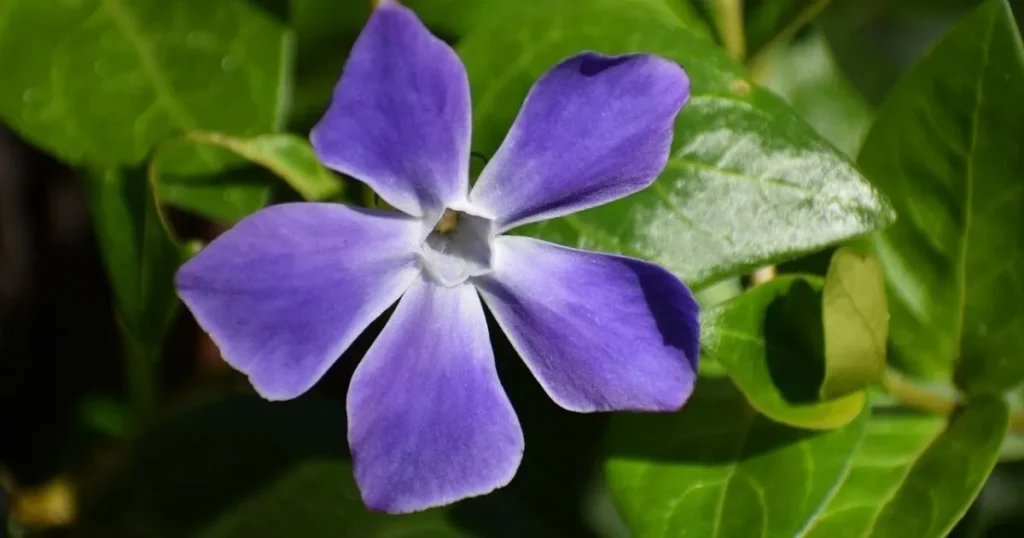
45. Evening Primroses
Plant Type: Perennial
Geographic Origin: North America
Plant Size: 1-3 feet tall
Sun Exposure: Full sun
Description: Evening Primroses bloom delicate purple flowers in the evening, adding a touch of nocturnal beauty to gardens.
Growing Tips: Thrives in well-drained soil and full sun. Water regularly, especially during dry spells, to keep the blooms healthy.
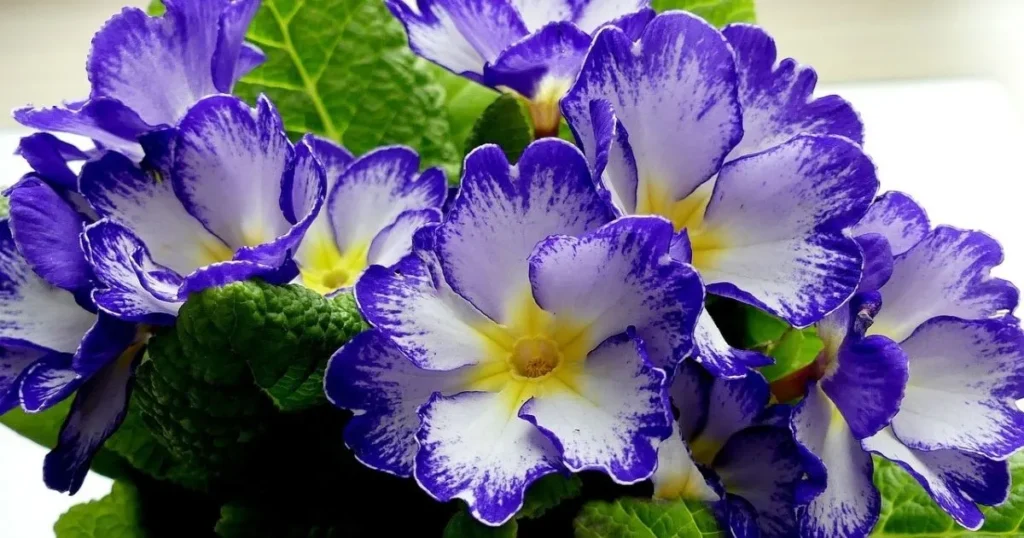
46. False Goat’s Beard
Plant Type: Perennial
Geographic Origin: North America
Plant Size: 2-5 feet tall
Sun Exposure: Full sun
Description: False Goat’s Beard produces tall, feathery purple blooms that resemble a goat’s beard, adding a unique texture to garden landscapes.
Growing Tips: Thrives in full sun and well-drained soil. Deadhead spent flowers to encourage additional blooming.
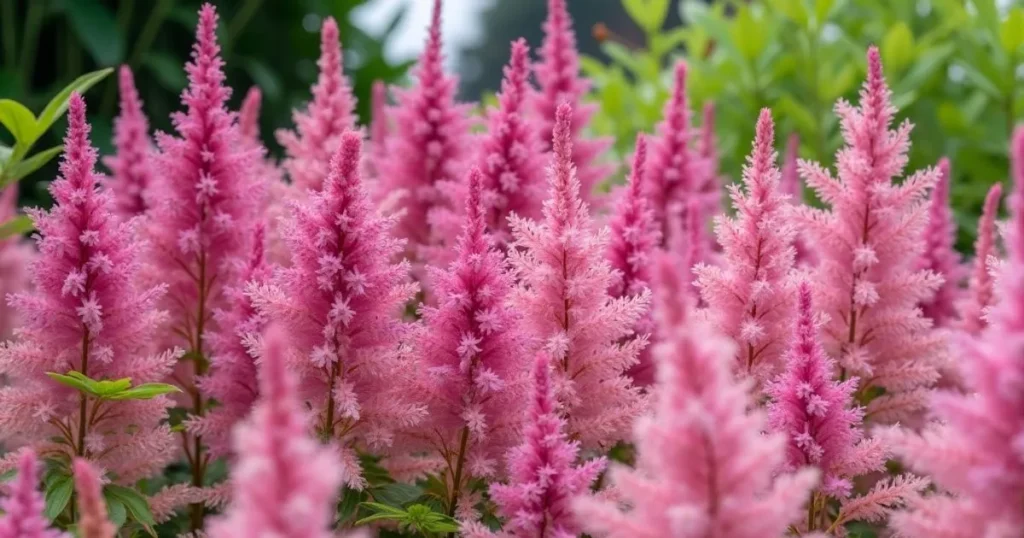
47. False Indigo
Plant Type: Perennial
Geographic Origin: North America
Plant Size: 3-4 feet tall
Sun Exposure: Full sun
Description: False Indigo is known for its long spikes of purple flowers that add height and visual interest to garden beds.
Growing Tips: Prefers well-drained soil and full sun. Tolerates dry conditions once established but will flourish with regular watering.
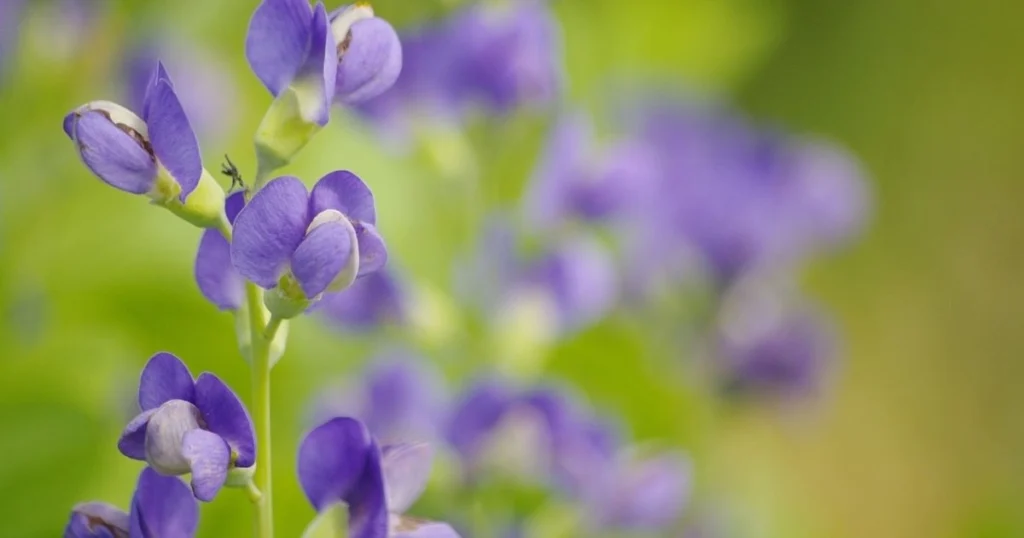
48. Foxglove
Plant Type: Biennial
Geographic Origin: Europe
Plant Size: 2-5 feet tall
Sun Exposure: Partial shade
Description: Foxglove plants have tall spikes filled with tubular purple flowers, perfect for adding height and drama to shaded garden spots.
Growing Tips: Prefers moist, well-drained soil and partial shade. Cut back spent flowers to encourage re-blooming.

49. Fuchsia
Plant Type: Perennial
Geographic Origin: Central and South America
Plant Size: 1-3 feet tall
Sun Exposure: Partial shade
Description: Fuchsia flowers have a bell-like shape, with vibrant purple hues hanging delicately from the plant, making them ideal for hanging baskets or containers.
Growing Tips: Prefers moist, well-drained soil and partial shade. Consistent watering and feeding will maintain the plant’s health and encourage blooms.
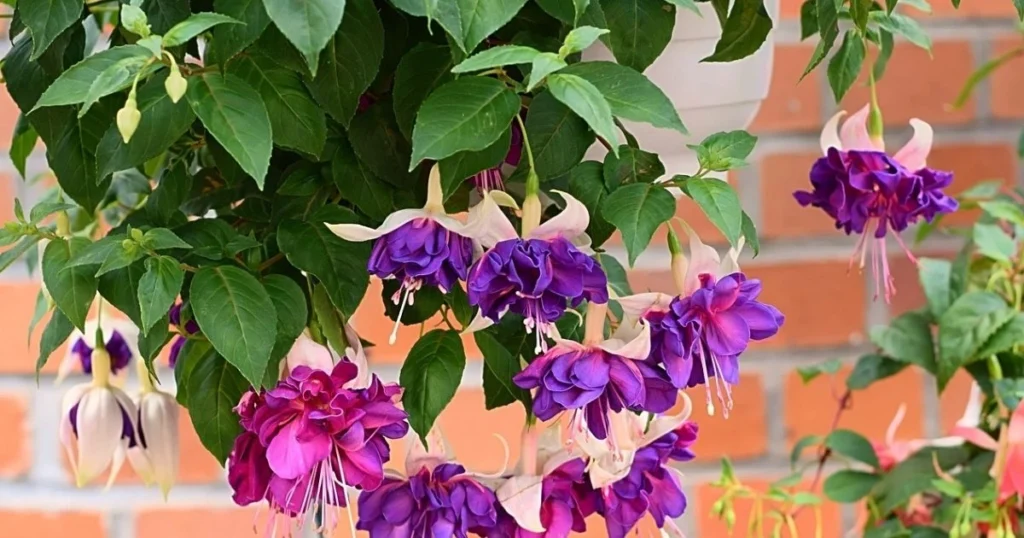
50. Garden Cosmos
Plant Type: Annual
Geographic Origin: Mexico
Plant Size: 2-4 feet tall
Sun Exposure: Full sun
Description: Cosmos flowers are vibrant purple with feathery petals, perfect for attracting pollinators to the garden.
Growing Tips: Prefers full sun and well-drained soil. Keep soil lightly moist, but avoid overwatering, to encourage continued blooming.
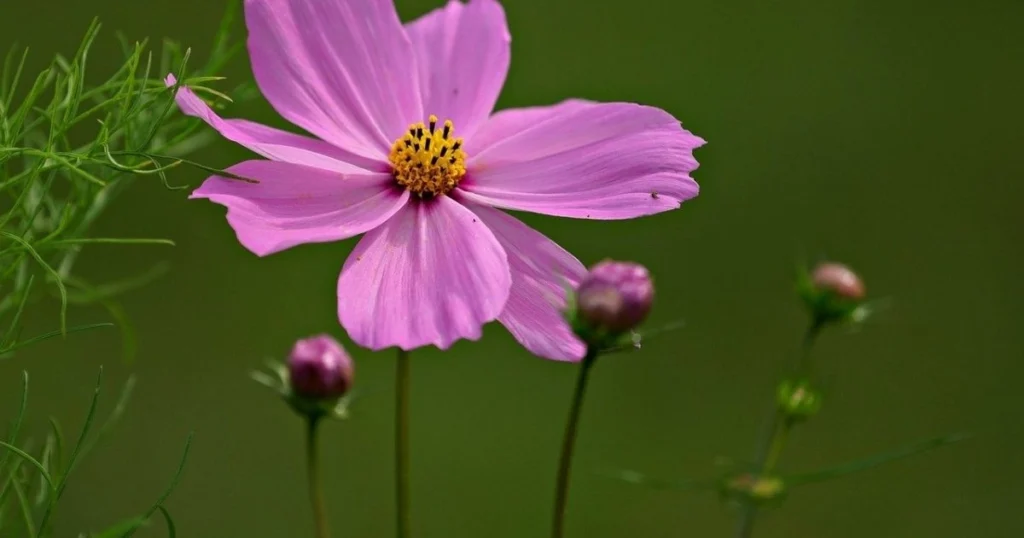
51. Geraldton Waxflower
Plant Type: Shrub
Geographic Origin: Australia
Plant Size: 3-6 feet tall
Sun Exposure: Full sun
Description: Small purple flowers with a waxy texture, perfect for adding a delicate touch to your garden.
Growing Tips: Thrives in full sun and well-drained soil. Avoid heavy, clay soils and ensure good air circulation to promote healthy growth.
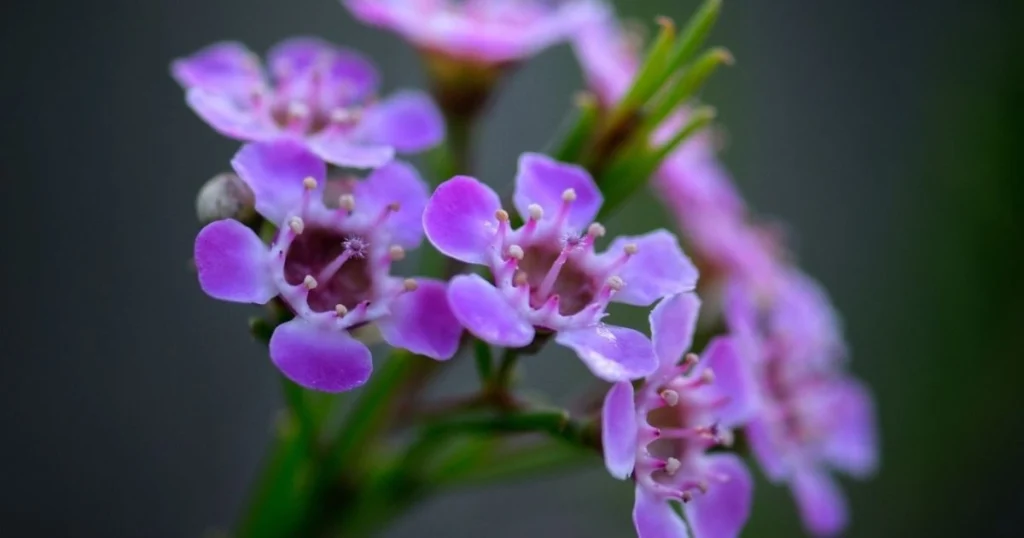
52. Gladiolus
Plant Type: Bulb
Geographic Origin: South Africa
Plant Size: 3-4 feet tall
Sun Exposure: Full sun
Description: Tall stalks with purple flowers arranged in a spike, offering a dramatic floral display.
Growing Tips: Prefers full sun and well-drained soil. Plant bulbs in the spring, spacing them 4-6 inches apart, and water regularly during the growing season.
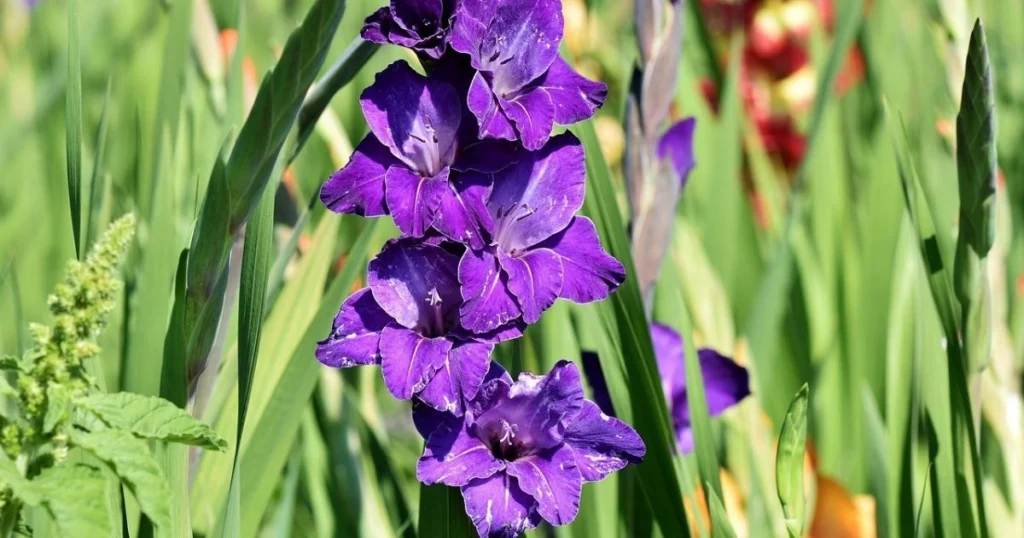
53. Globe Artichoke
Plant Type: Perennial
Geographic Origin: Mediterranean
Plant Size: 3-4 feet tall
Sun Exposure: Full sun
Description: Large, purple thistle-like flowers that can also be harvested for their edible buds.
Growing Tips: Prefers full sun and well-drained soil. Ensure the soil is rich in nutrients and water regularly, especially during dry periods.
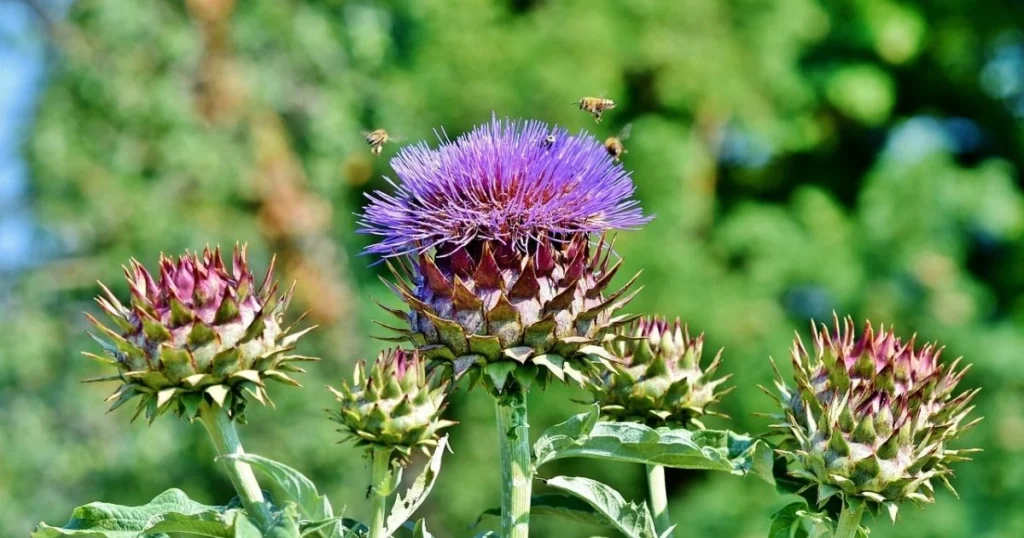
54. Globe Thistles
Plant Type: Perennial
Geographic Origin: Europe
Plant Size: 3 feet tall
Sun Exposure: Full sun
Description: Spiky, spherical purple blooms that attract pollinators.
Growing Tips: Prefers full sun and well-drained soil. It is drought-tolerant once established, but regular watering will encourage better blooms.
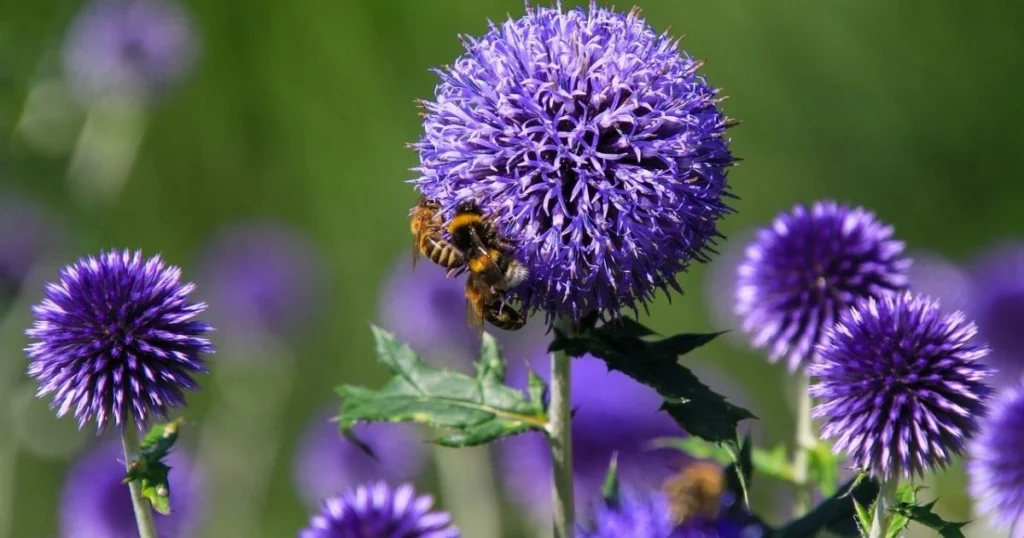
55. Gloxinia
Plant Type: Perennial
Geographic Origin: South America
Plant Size: 12-18 inches tall
Sun Exposure: Partial shade
Description: Bell-shaped purple flowers with soft petals, perfect for indoor gardens.
Growing Tips: Prefers partial shade and moist, well-drained soil. Keep the soil consistently moist, but avoid overwatering to prevent root rot.
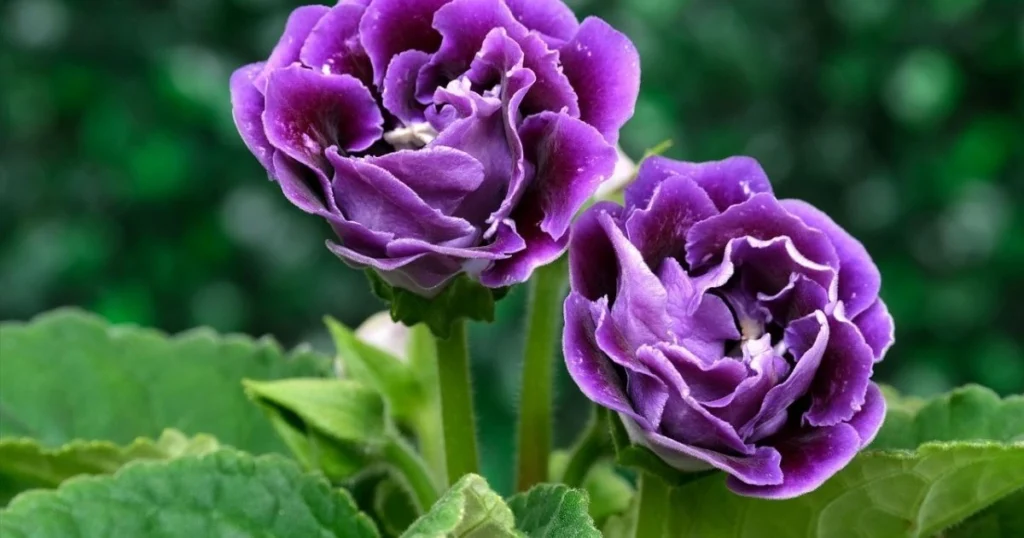
56. Hardy Geranium
Plant Type: Perennial
Geographic Origin: Europe, Asia
Plant Size: 1-2 feet tall
Sun Exposure: Partial to full sun
Description: Clusters of small, purple, star-like flowers, offering long-lasting color.
Growing Tips: Prefers partial to full sun and well-drained soil. Water regularly and prune after blooming to encourage fresh growth.
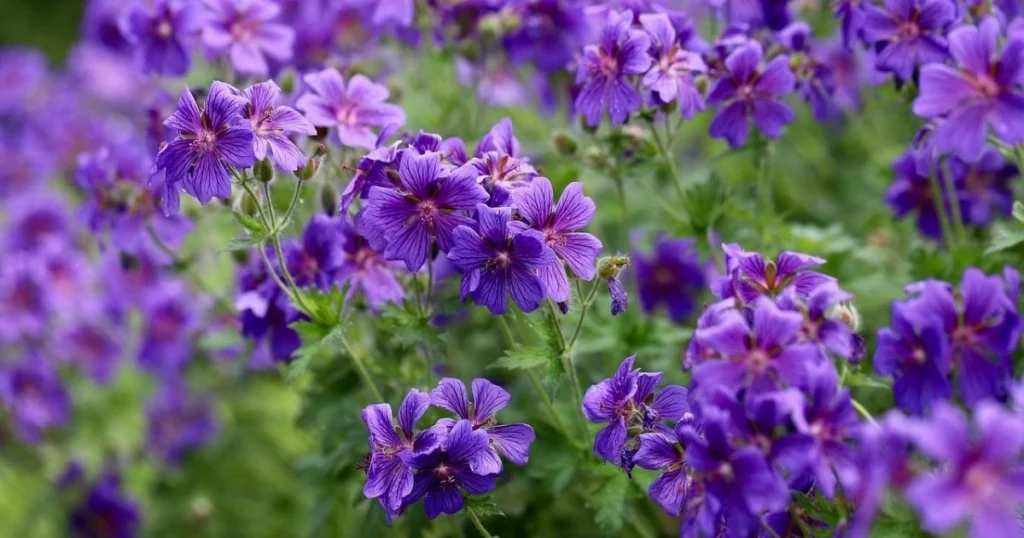
57. Heliotrope
Plant Type: Perennial
Geographic Origin: South America
Plant Size: 12-18 inches tall
Sun Exposure: Full sun
Description: Fragrant purple flowers that turn toward the sun, known for their sweet scent.
Growing Tips: Prefers full sun and well-drained soil. Keep soil moist, but avoid overwatering. Remove dead flowers regularly to promote continuous blooms.

58. Hellebore
Plant Type: Perennial
Geographic Origin: Europe, Asia
Plant Size: 1-2 feet tall
Sun Exposure: Partial shade
Description: Large purple flowers that bloom in early spring, often before many other plants.
Growing Tips: Thrives in partial shade and well-drained, moist soil. Plant in fall to enjoy early spring blooms.
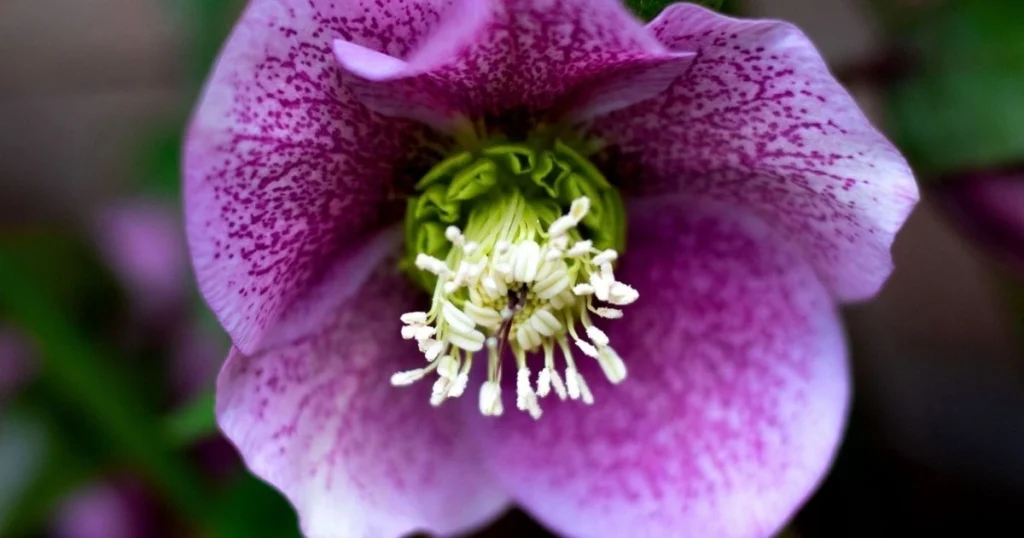
59. Hollyhock
Plant Type: Biennial
Geographic Origin: Europe, Asia
Plant Size: 4-8 feet tall
Sun Exposure: Full sun
Description: Tall stalks with large, purple flowers in various shades, perfect for creating vertical interest in the garden.
Growing Tips: Prefers full sun and well-drained soil. Water regularly and stake tall plants to prevent them from falling over.
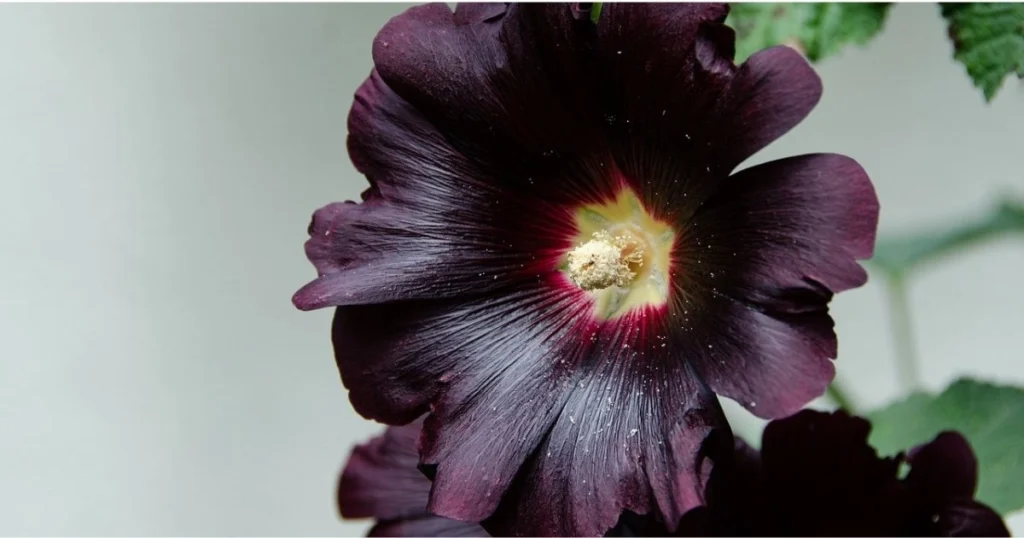
60. Honeywort
Description: Purple tubular flowers with a honey-like scent, great for attracting bees.
Growing Tips: Prefers full sun and well-drained soil. Water regularly during the growing season, letting the soil dry slightly between waterings.
Plant Type: Annual
Geographic Origin: Mediterranean
Plant Size: 1-2 feet tall
Sun Exposure: Full sun
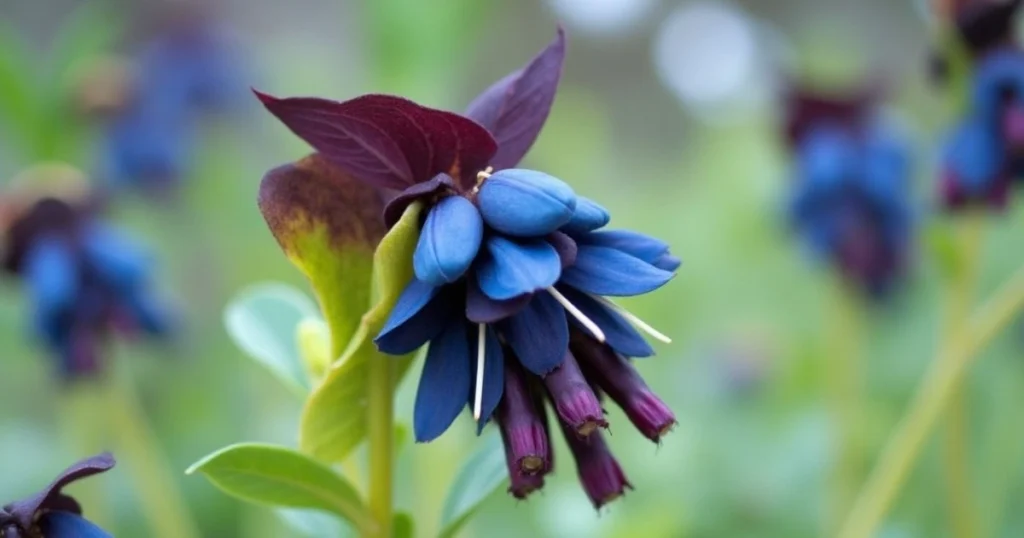
61. Hummelo Betony
Plant Type: Perennial
Geographic Origin: Europe
Plant Size: 18-24 inches tall
Sun Exposure: Full sun
Description: Spiky purple flowers that attract pollinators, ideal for a low-maintenance garden.
Growing Tips: Prefers full sun and well-drained soil. Once established, it’s drought-resistant but benefits from occasional watering during dry spells.
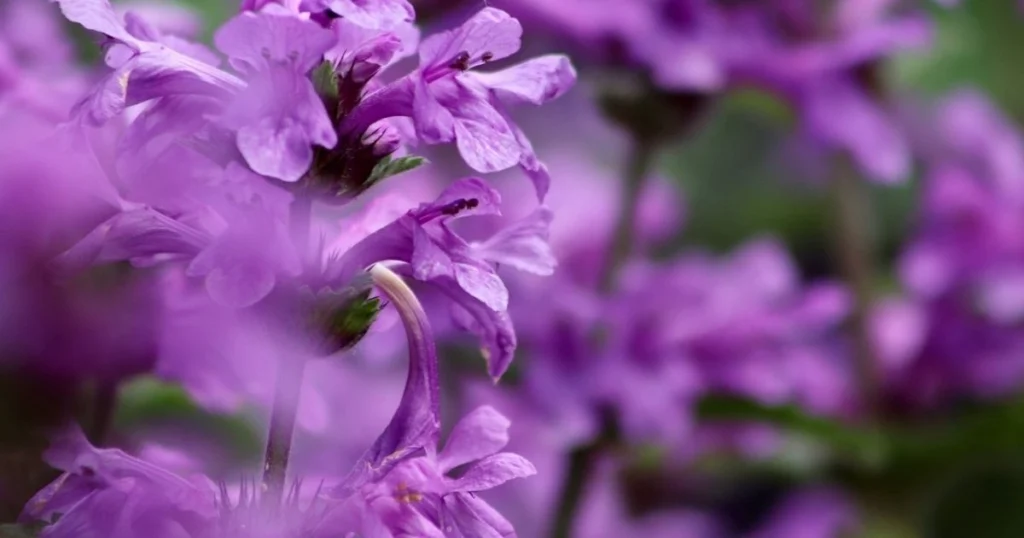
62. Hyacinth
Plant Type: Bulb
Geographic Origin: Eastern Mediterranean
Plant Size: 6-12 inches tall
Sun Exposure: Full sun
Description: Fragrant, clustered purple flowers, perfect for adding early spring color.
Growing Tips: Prefers full sun and well-drained, moist soil. Plant bulbs in the fall, and provide a cold period to promote blooming.
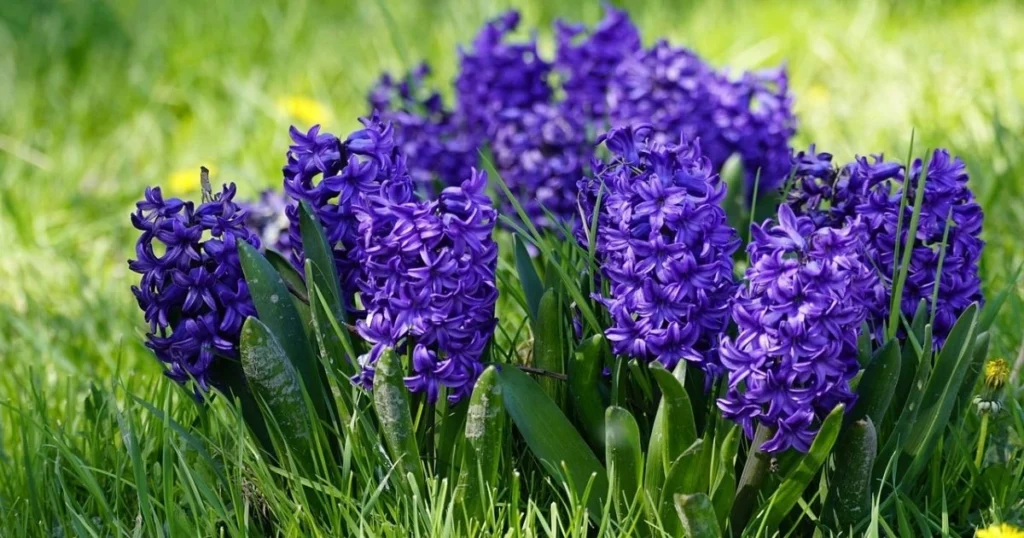
63. Hydrangea
Plant Type: Shrub
Geographic Origin: Asia, Americas
Plant Size: 3-6 feet tall
Sun Exposure: Partial shade
Description: Large, round clusters of purple flowers, often used as a focal point in gardens.
Growing Tips: Prefers partial shade and moist, well-drained soil. Trim after blooming to maintain its form and promote new growth.
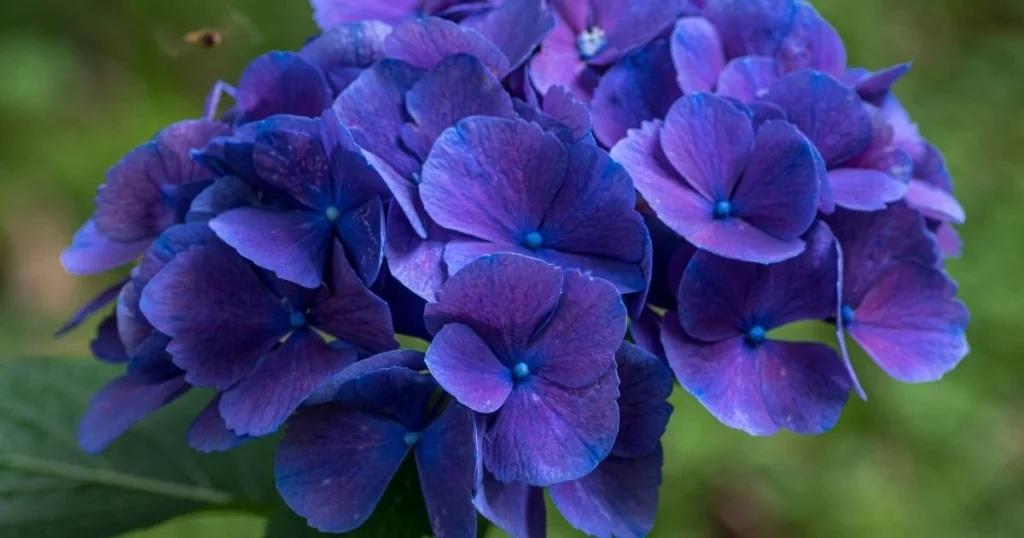
64. Italian Aster
Plant Type: Perennial
Geographic Origin: Europe
Plant Size: 1-2 feet tall
Sun Exposure: Full sun
Description: Daisy-like purple flowers with a bright yellow center, adding color to late-season gardens.
Growing Tips: Prefers full sun and well-drained soil. Water regularly and remove dead flowers to extend the blooming period.

65. Iris Pumila
Plant Type: Perennial
Geographic Origin: Europe, Asia
Plant Size: 8-12 inches tall
Sun Exposure: Full sun
Description: Compact, purple iris flowers, ideal for rock gardens or as ground cover.
Growing Tips: Prefers full sun and well-drained soil. Water sparingly once established and avoid excess moisture during winter.
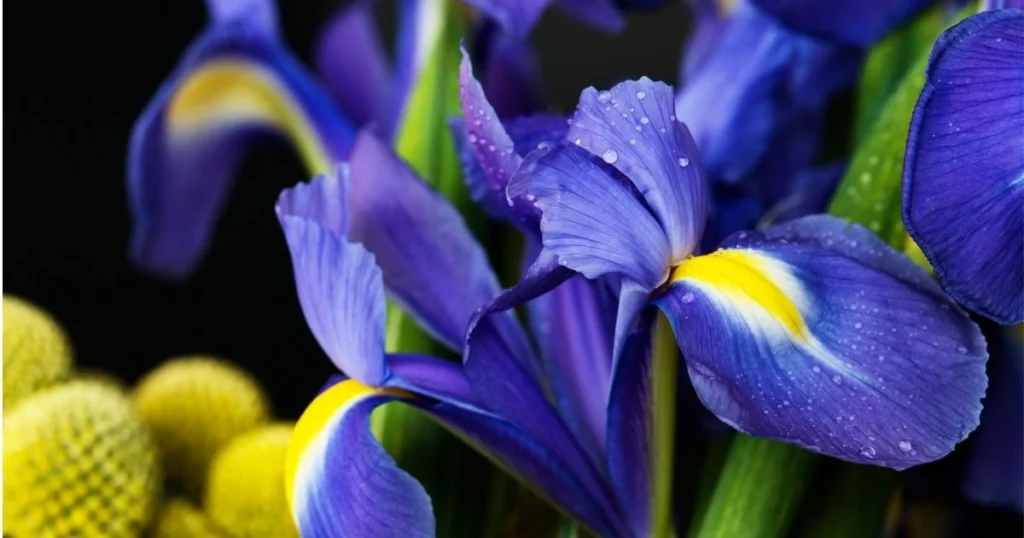
66. Lavender
Plant Type: Perennial
Geographic Origin: Mediterranean
Plant Size: 1-3 feet tall
Sun Exposure: Full sun
Description: Fragrant purple flowers that bloom in spikes, perfect for attracting pollinators and for use in aromatherapy.
Growing Tips: Prefers full sun and well-drained soil. Prevent root rot by avoiding overwatering and ensuring proper drainage.
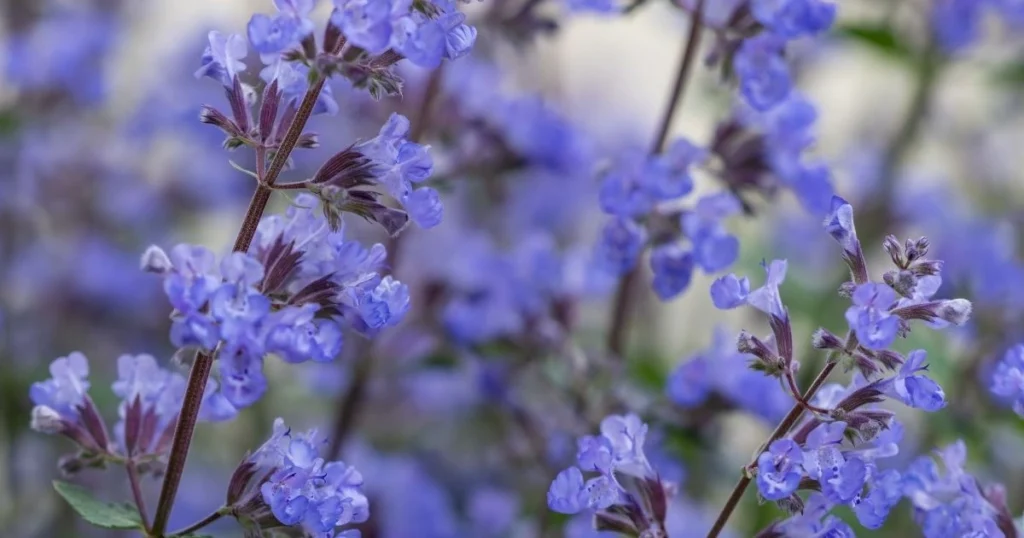
67. Leather Flower
Plant Type: Perennial
Geographic Origin: North America
Plant Size: 4-6 feet tall
Sun Exposure: Partial sun
Description: Unique purple flowers with leather-like petals, perfect for adding texture to your garden.
Growing Tips: Thrives in partial sun and well-drained soil. Water regularly, especially during dry spells, and prune after flowering.
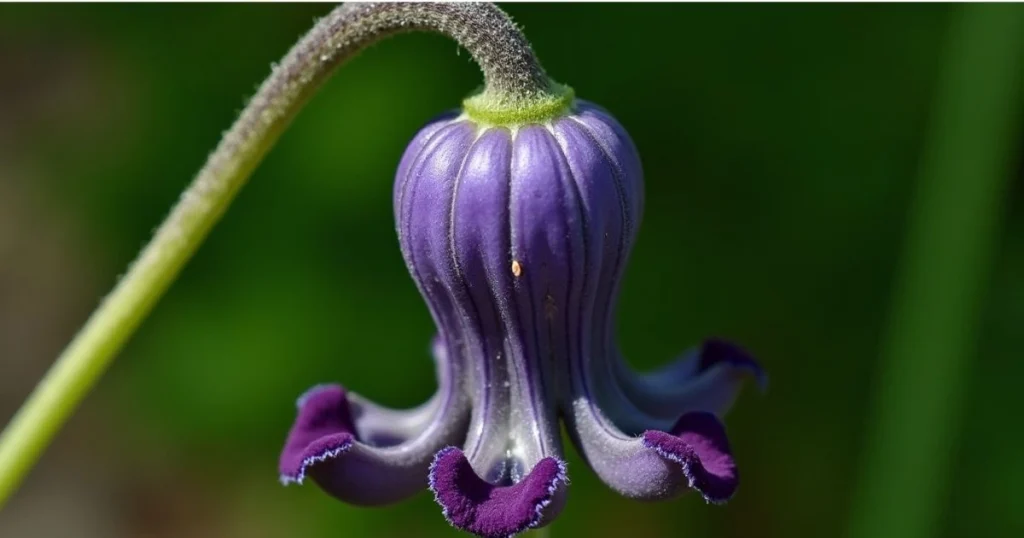
68. Lilac
Plant Type: Shrub
Geographic Origin: Europe, Asia
Plant Size: 5-10 feet tall
Sun Exposure: Full sun
Description: Small clusters of fragrant purple flowers, known for their sweet scent.
Growing Tips: Prefers full sun and well-drained soil. Trim after blooming to maintain its form and promote new growth.
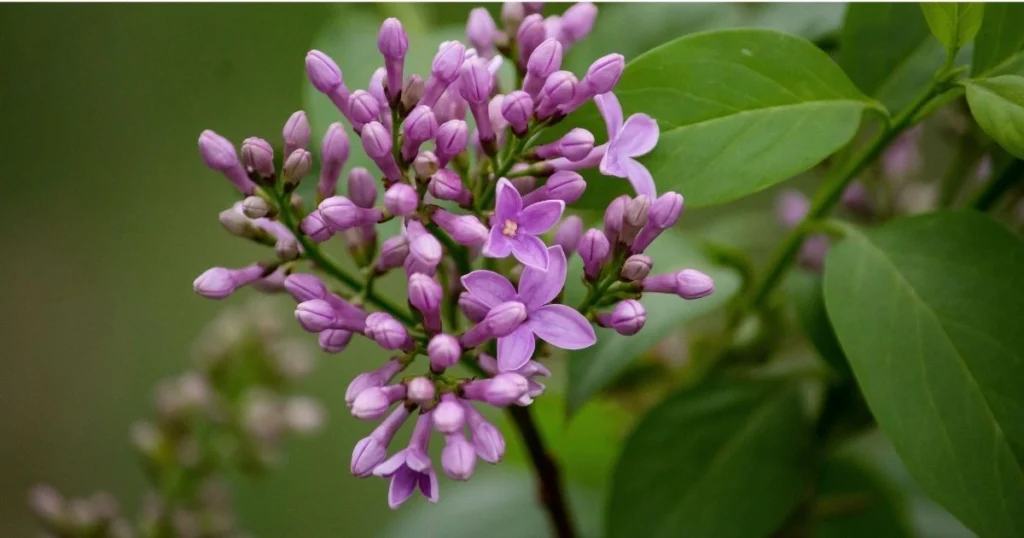
69. Lily of the Incas
Plant Type: Perennial
Geographic Origin: South America
Plant Size: 1-2 feet tall
Sun Exposure: Full sun
Description: Purple, trumpet-shaped flowers with a tropical flair, adding exotic beauty to your garden.
Growing Tips: Prefers full sun and well-drained soil. Water regularly but avoid overwatering, and feed with a balanced fertilizer during the growing season.
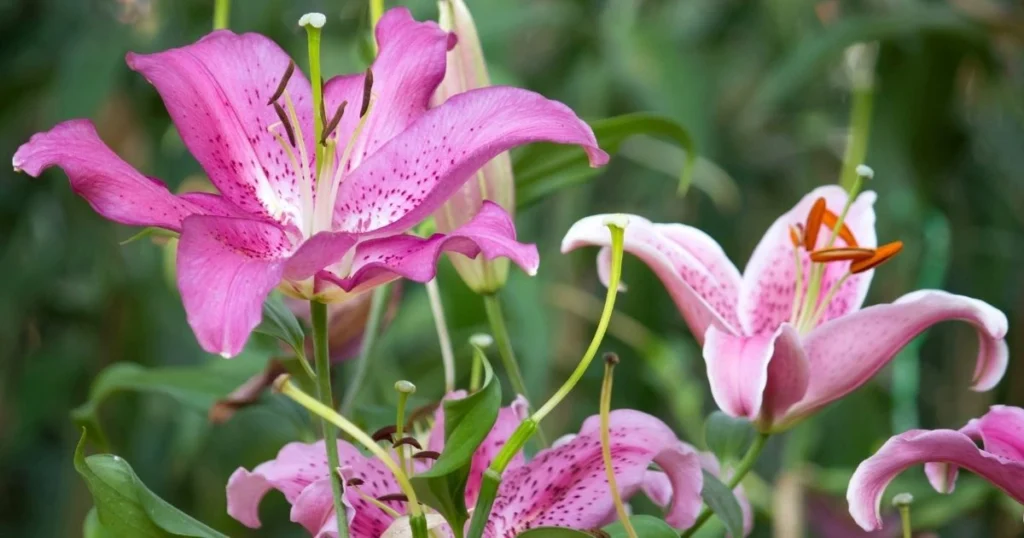
70. Lily of the Nile
Plant Type: Perennial
Geographic Origin: South Africa
Plant Size: 3-4 feet tall
Sun Exposure: Full sun
Description: Large clusters of purple flowers on tall stems, creating a striking display in your garden.
Growing Tips: Prefers full sun and well-drained soil. Water regularly during the growing season and mulch to retain moisture in hot climates.
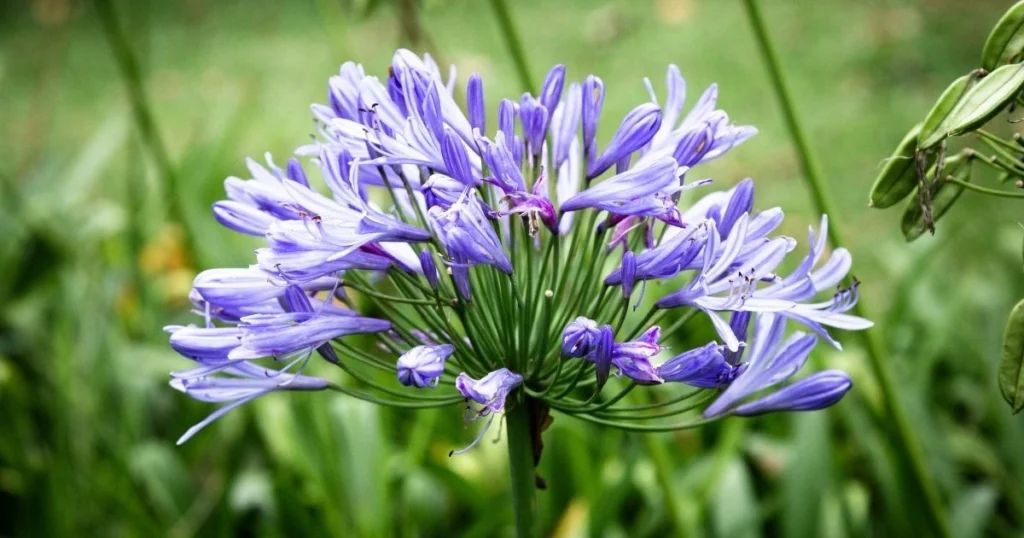
71. Lily Turf
- Plant Type: Perennial
- Geographic Origin: Eastern Asia
- Plant Size: 1-2 feet tall
- Sun Exposure: Full sun to partial shade
Description: Lily Turf features purple flowers with grass-like foliage that adds texture and color to garden beds or as ground cover. It provides a neat, low-maintenance solution for edging or borders.
Growing Tips: Prefers full sun to partial shade and well-drained soil. Tolerates drought conditions once established but benefits from occasional watering.
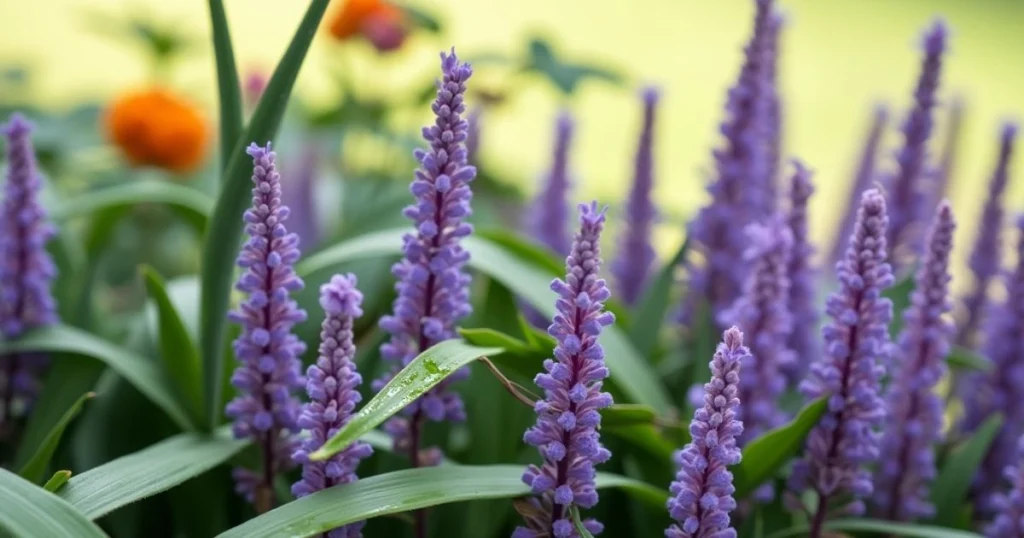
72. Lungwort
- Plant Type: Perennial
- Geographic Origin: Europe, Asia
- Plant Size: 1-1.5 feet tall
- Sun Exposure: Partial shade
Description: Lungwort displays spotted purple flowers with attractive foliage that often has a silvery pattern. It’s ideal for woodland gardens or shady areas.
Growing Tips: Prefers partial shade and moist, well-drained soil. Maintain consistent soil moisture and use mulch to retain it.
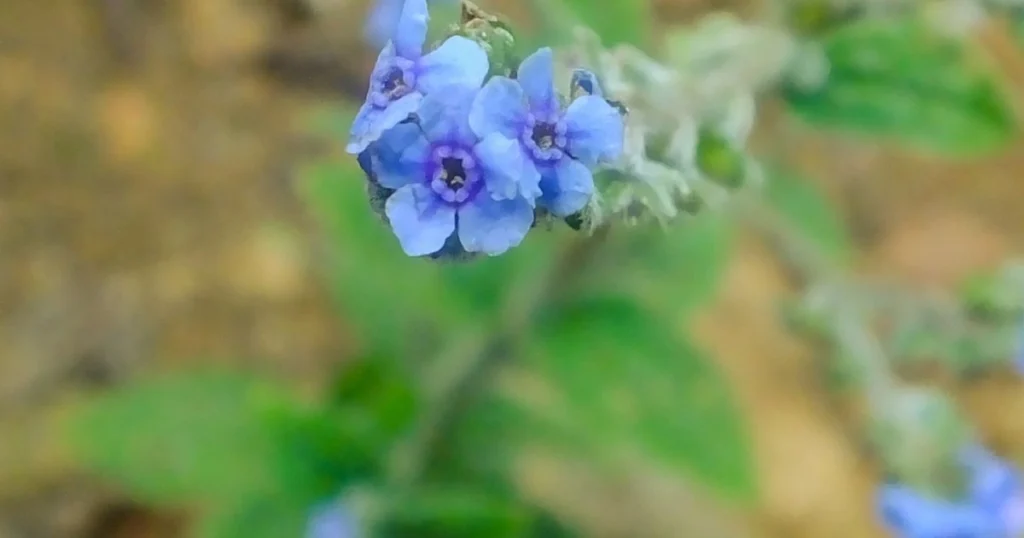
73. Lupine
- Plant Type: Perennial
- Geographic Origin: North America, Europe
- Plant Size: 2-4 feet tall
- Sun Exposure: Full sun
Description: Lupine produces spikes of purple flowers resembling pea flowers, making it a stunning choice for borders or wildflower gardens.
Growing Tips: Prefers full sun and well-drained soil. Once established, it can withstand drought and poor soil conditions.
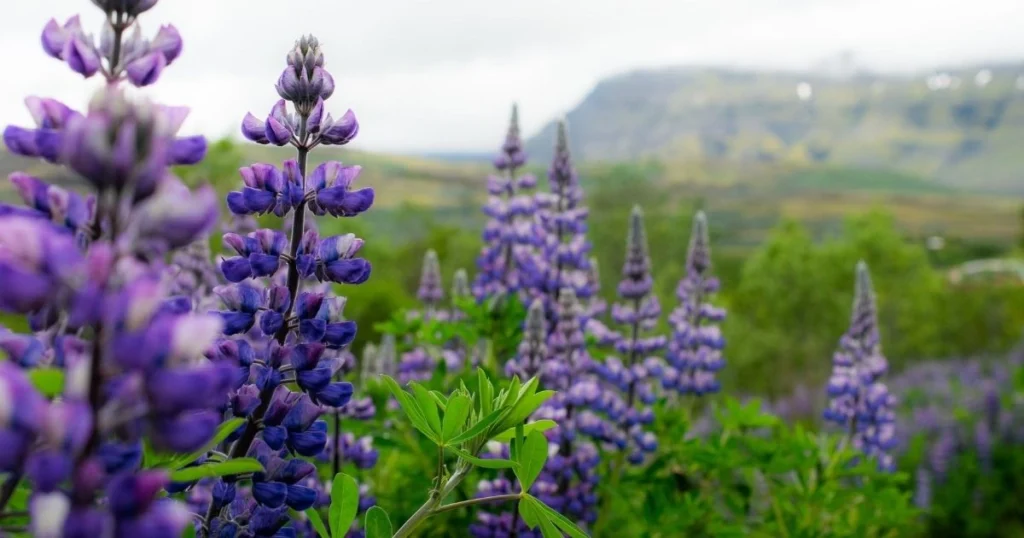
74. Meadow Sage
- Plant Type: Perennial
- Geographic Origin: Europe, Asia
- Plant Size: 1-3 feet tall
- Sun Exposure: Full sun
Description: Meadow Sage features long spikes with small purple flowers that bloom in clusters. It attracts pollinators like bees and butterflies.
Growing Tips: Prefers full sun and well-drained soil. Water moderately during the growing season and cut back after flowering to maintain shape.
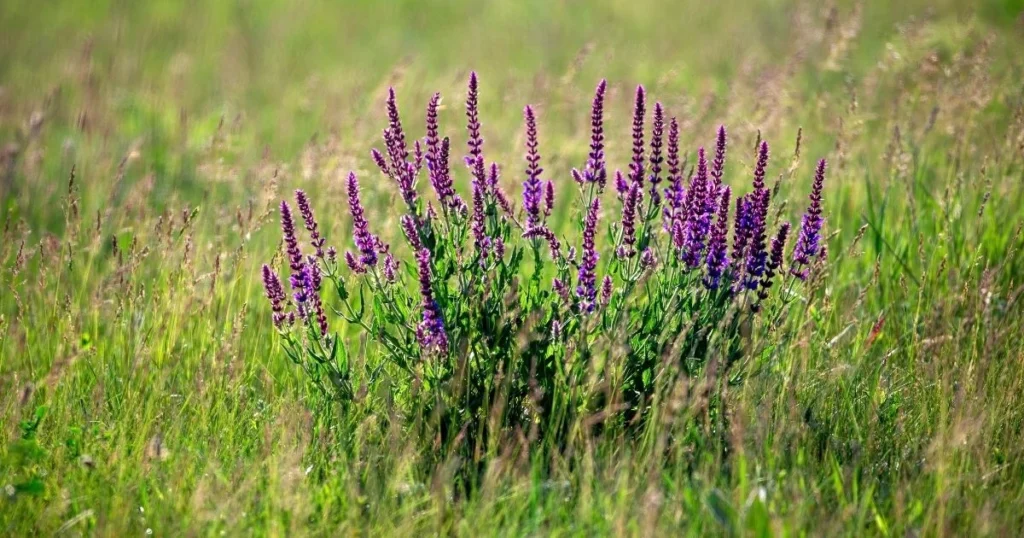
75. Melastoma
- Plant Type: Shrub
- Geographic Origin: Southeast Asia
- Plant Size: 3-6 feet tall
- Sun Exposure: Full sun
Description: Melastoma showcases large, striking purple flowers with deep colors. It is an eye-catching plant for tropical and subtropical gardens.
Growing Tips: Prefers well-drained soil and full sun. Regular watering is needed during the growing season, especially in hot climates.
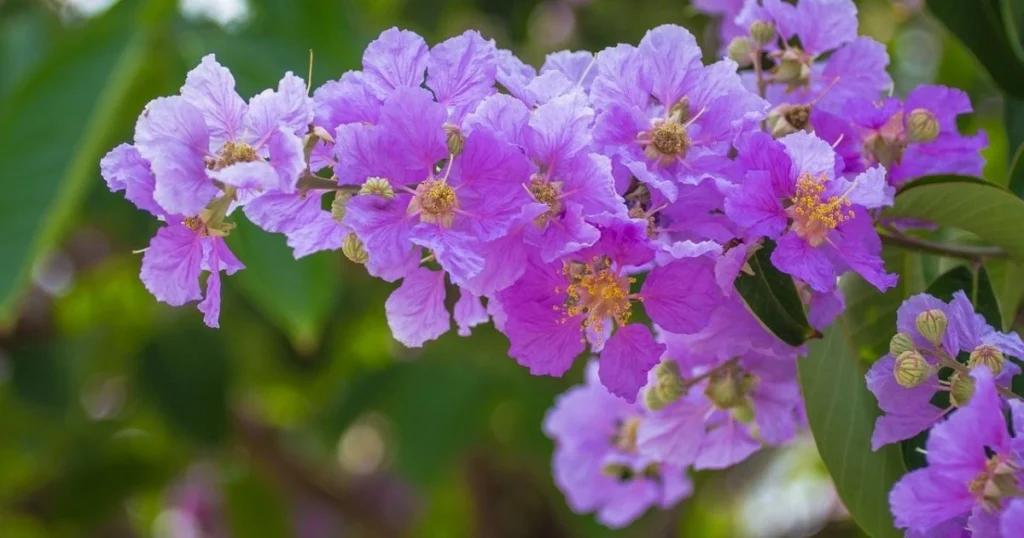
76. Mistflower
- Plant Type: Perennial
- Geographic Origin: North America
- Plant Size: 1-2 feet tall
- Sun Exposure: Full sun
Description: Mistflower produces small purple clusters that attract butterflies, making it a great addition to wildlife gardens.
Growing Tips: Prefers full sun and well-drained soil. Deadhead regularly to encourage continuous blooms.
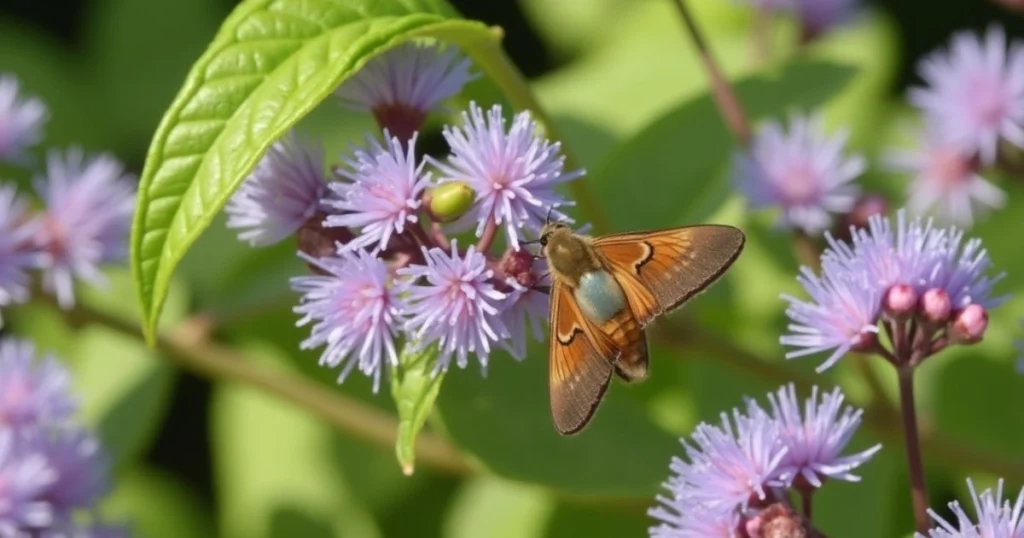
77. Moonflower
- Plant Type: Perennial
- Geographic Origin: Tropical America
- Plant Size: 10-15 feet tall
- Sun Exposure: Full sun
Description: Moonflower blooms large, fragrant, trumpet-shaped purple flowers that open in the evening, creating a spectacular nighttime display.
Growing Tips: Thrives in full sun and well-drained soil. Water regularly and support the plant with trellises for best growth.
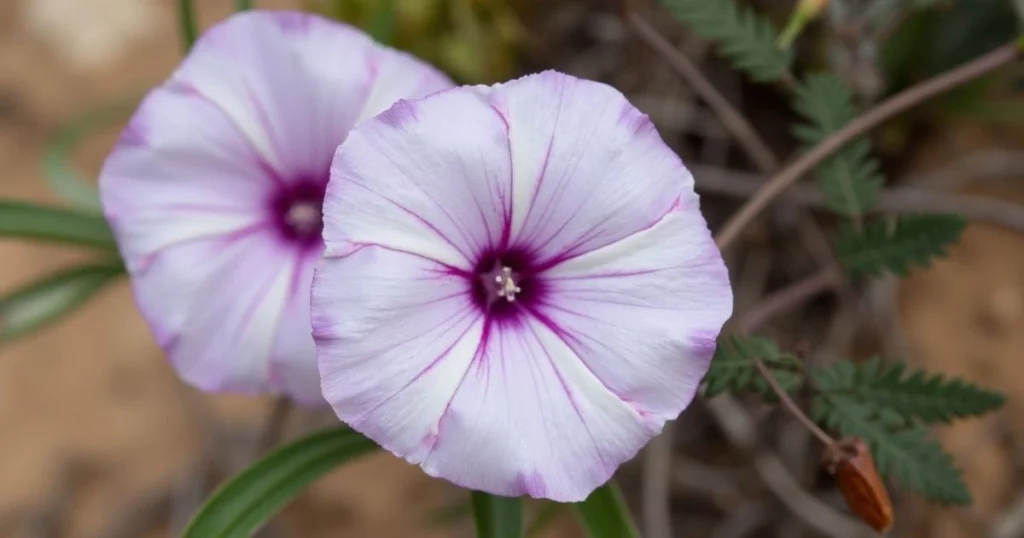
78. Morning Glory
- Plant Type: Annual
- Geographic Origin: Tropical America
- Plant Size: 6-10 feet tall
- Sun Exposure: Full sun
Description: Morning Glory produces trumpet-shaped purple flowers that bloom in the morning and close by afternoon, adding a vibrant touch to fences and trellises.
Growing Tips: Prefers full sun and well-drained soil. Consistent watering is crucial during the growing season, but be sure not to overwater.
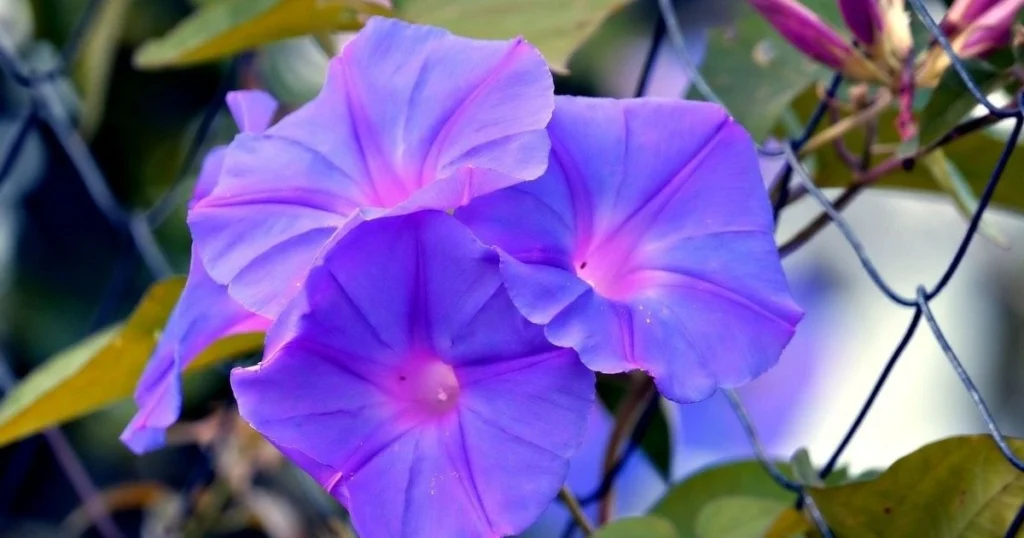
79. Moss Verbena
- Plant Type: Perennial
- Geographic Origin: South America
- Plant Size: 1-2 feet tall
- Sun Exposure: Full sun
Description: Moss Verbena features purple flowers that form dense clusters, ideal for hanging baskets, ground cover, or garden borders.
Growing Tips: Prefers full sun and well-drained soil. Water deeply during dry spells and let the soil dry out between waterings.
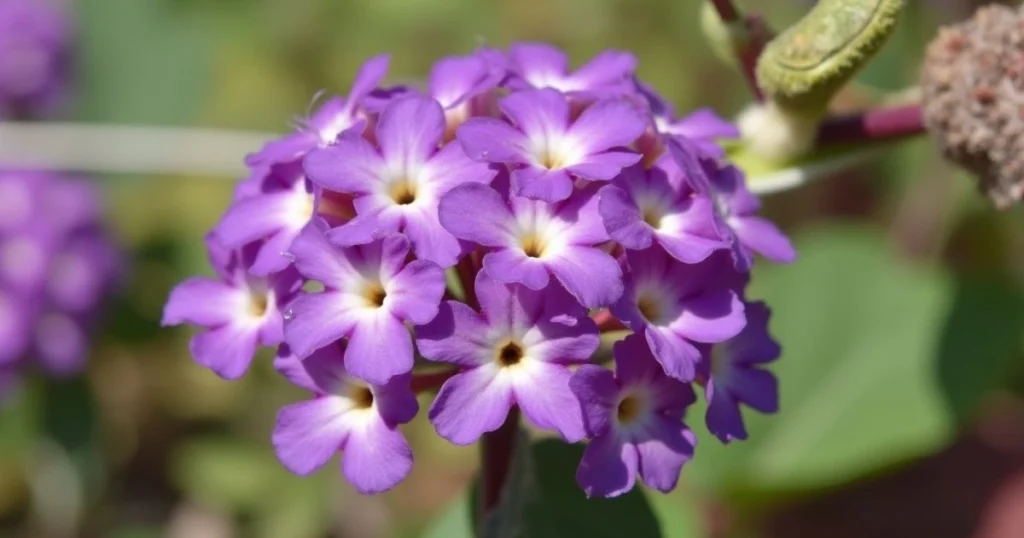
80. Mountain Cornflower
- Plant Type: Perennial
- Geographic Origin: Europe, Asia
- Plant Size: 1-2 feet tall
- Sun Exposure: Full sun
Description: Mountain Cornflower produces bright purple, thistle-like blooms that add texture and color to garden beds and meadows.
Growing Tips: Prefers full sun and well-drained soil. Requires moderate watering and benefits from cutting back after flowering to maintain shape.
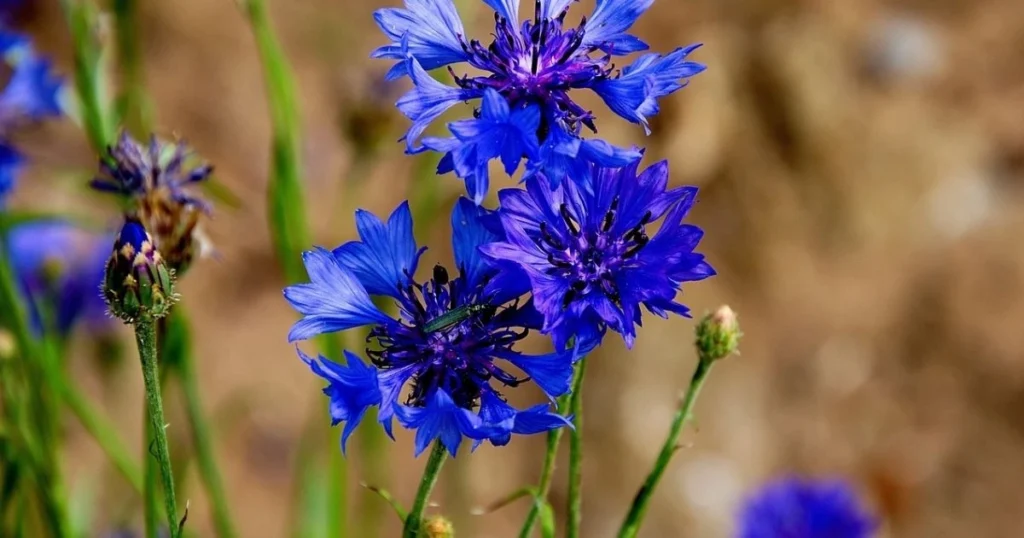
81. Pansy
- Plant Type: Annual
- Geographic Origin: Europe
- Plant Size: 6-9 inches tall
- Sun Exposure: Full sun to partial shade
Description: Pansies feature soft, colorful purple flowers with a wide variety of patterns. They are perfect for spring and fall displays in containers, hanging baskets, or flower beds.
Growing Tips: Prefers cool temperatures and well-drained soil. Water regularly but avoid overwatering. Remove dead flowers regularly to promote additional blooms.
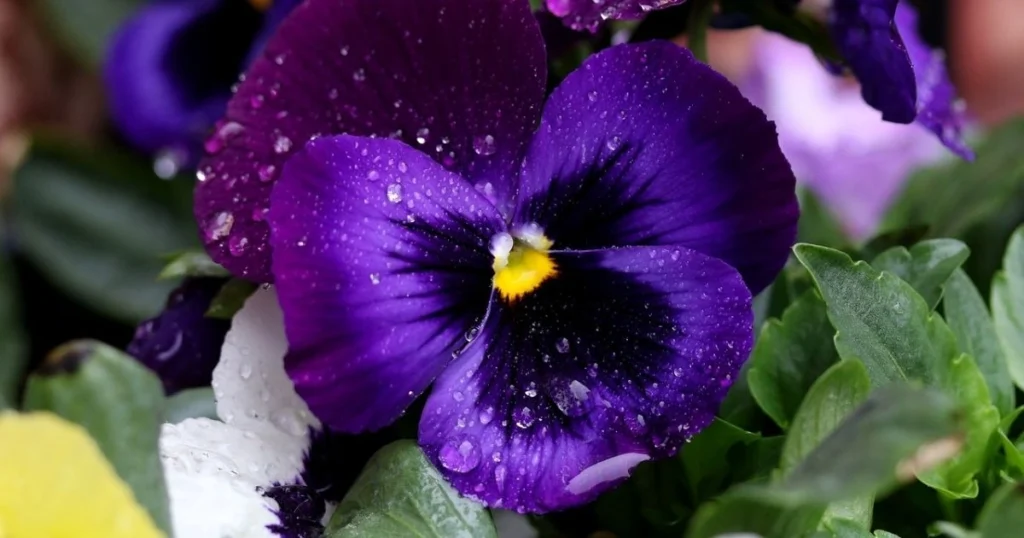
82. Pasque Flower
- Plant Type: Perennial
- Geographic Origin: Europe, Asia, North America
- Plant Size: 1-1.5 feet tall
- Sun Exposure: Full sun
Description: Pasque Flower produces delicate purple flowers with feathery petals, which are among the first to bloom in spring.
Growing Tips: Prefers full sun and well-drained, sandy soil. Water moderately and avoid overly wet conditions, as they are susceptible to root rot.
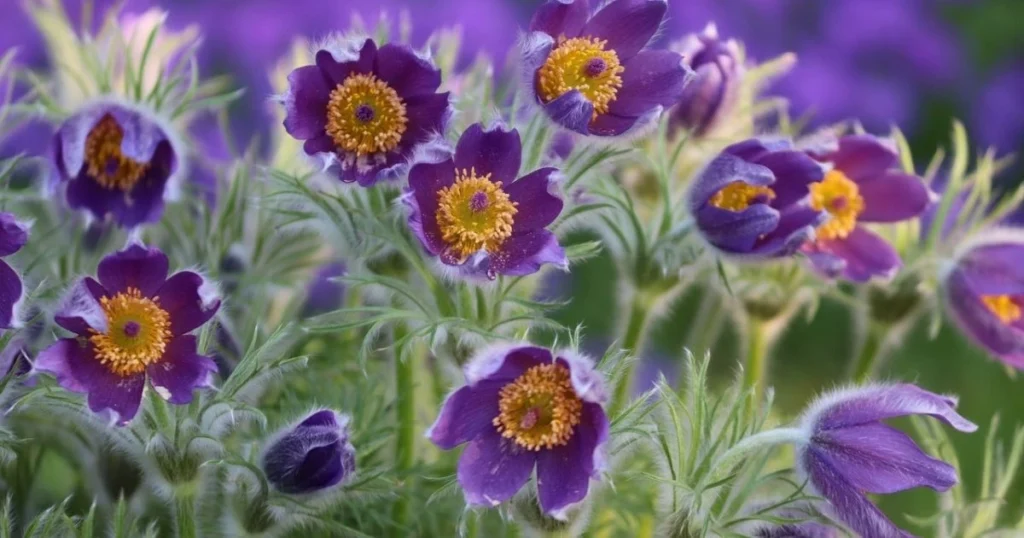
83. Passion Flowers
- Plant Type: Vine
- Geographic Origin: Tropical America
- Plant Size: 10-15 feet tall
- Sun Exposure: Full sun
Description: Passion Flowers feature intricate purple flowers with unique, showy petals. They are often grown for their stunning blooms and exotic appeal.
Growing Tips: Prefers full sun and well-drained soil. Provide support such as a trellis for the vines to climb and water regularly to keep the soil moist.
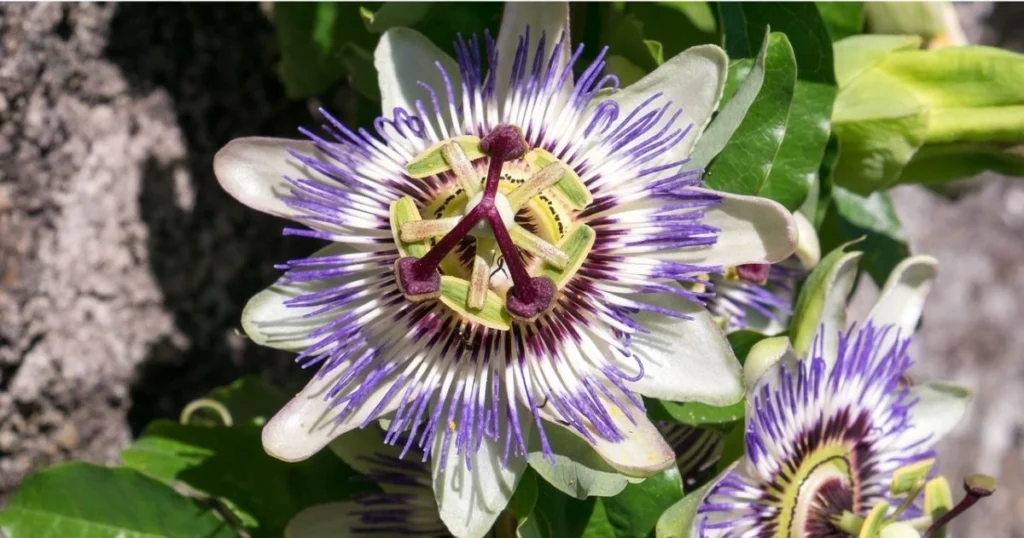
84. Peony
- Plant Type: Perennial
- Geographic Origin: Europe, Asia, North America
- Plant Size: 2-3 feet tall
- Sun Exposure: Full sun to partial shade
Description: Peony plants produce large, vibrant purple blooms with a sweet fragrance, making them a favorite for ornamental gardens and cut flowers.
Growing Tips: Prefers full sun and well-drained soil. Water deeply, especially during dry spells, and apply mulch to retain moisture.
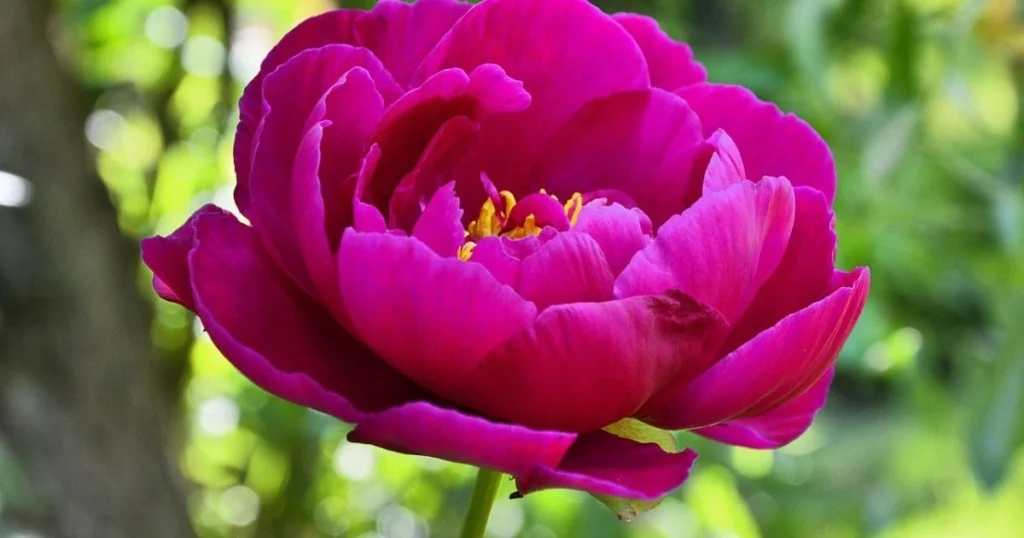
85. Perennial Sweet Pea
- Plant Type: Perennial
- Geographic Origin: Europe
- Plant Size: 4-6 feet tall
- Sun Exposure: Full sun to partial shade
Description: Perennial Sweet Pea is a climbing vine with fragrant purple flowers that add a delightful scent and colorful display to trellises, fences, or arbors.
Growing Tips: Prefers full sun and well-drained soil. Water regularly and trim after flowering to stimulate new growth.consistently and prune after flowering to encourage new growth.
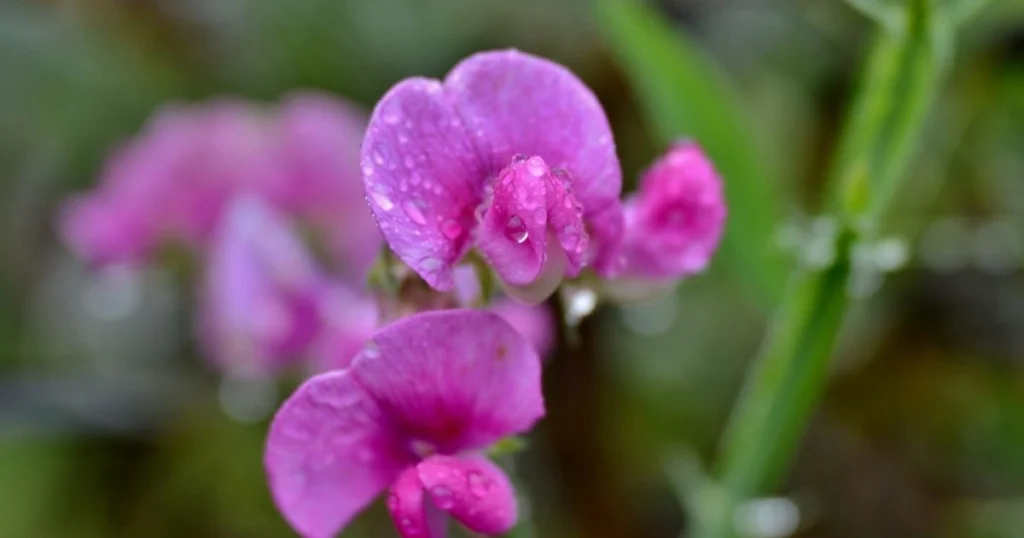
86. Phlox
- Plant Type: Perennial
- Geographic Origin: North America
- Plant Size: 1-4 feet tall
- Sun Exposure: Full sun to partial shade
Description: Phlox plants produce vibrant purple flowers with a strong, sweet scent. They make excellent additions to garden borders and flower beds.
Growing Tips: Prefers full sun and well-drained soil. Water regularly and ensure good air circulation to prevent disease.
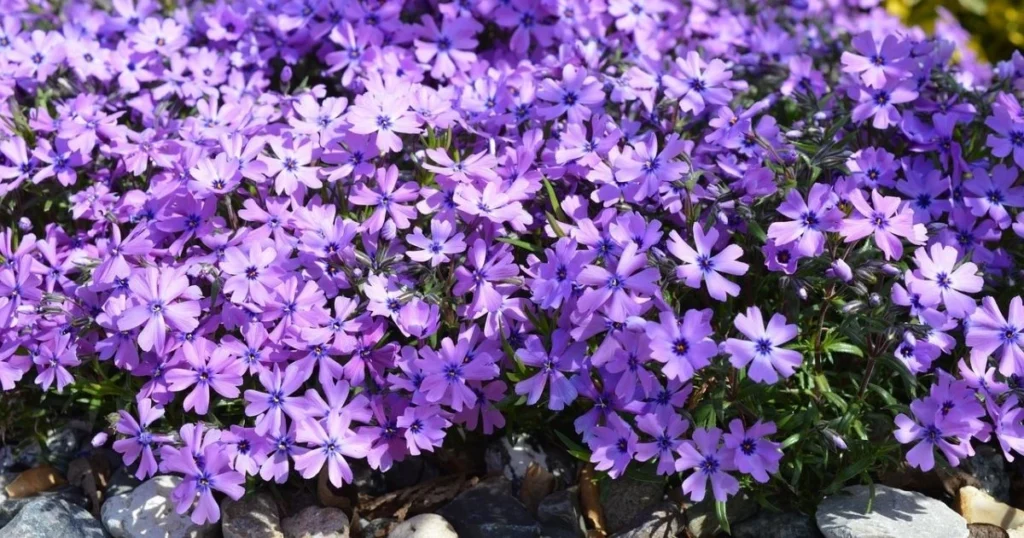
87. Plumbago
- Plant Type: Shrub
- Geographic Origin: South Africa
- Plant Size: 3-6 feet tall
- Sun Exposure: Full sun to partial shade
Description: Plumbago features clusters of small, light purple flowers that add a soft, airy touch to your garden. It is often used as a background plant or ground cover.
Growing Tips: Prefers full sun and well-drained soil. Water regularly during the growing season and prune in early spring to maintain shape.
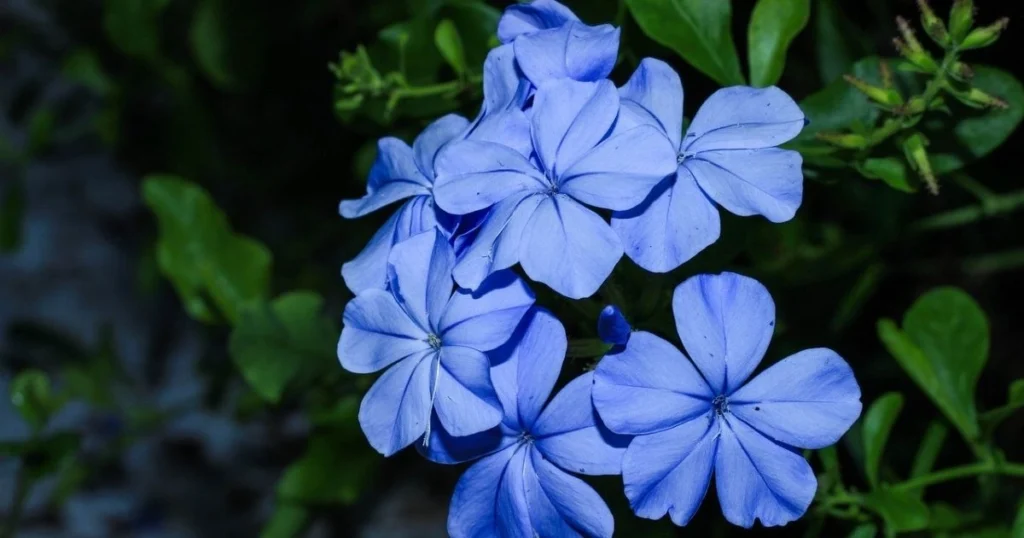
88. Primrose
- Plant Type: Perennial
- Geographic Origin: Europe, Asia
- Plant Size: 6-12 inches tall
- Sun Exposure: Partial shade
Description: Primrose displays small, delicate purple flowers that bloom early in the season, often in late winter or early spring.
Growing Tips: Prefers partial shade and moist, well-drained soil. Keep the soil consistently moist, but avoid letting the plants sit in waterlogged soil.
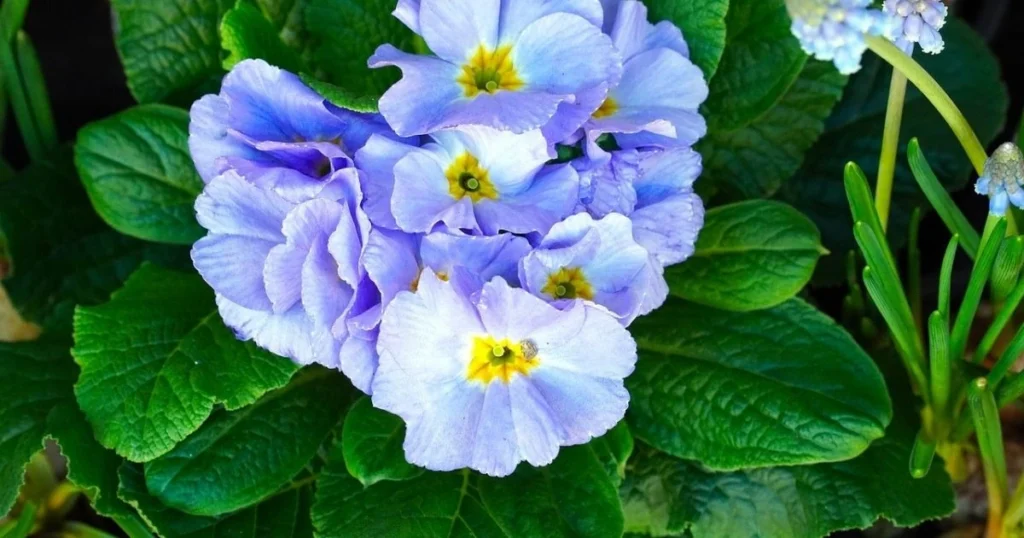
89. Purple Coneflower
- Plant Type: Perennial
- Geographic Origin: North America
- Plant Size: 2-4 feet tall
- Sun Exposure: Full sun
Description: Purple Coneflower features spiky purple flowers with an orange center, attracting bees, butterflies, and birds. It is well-suited for wildflower gardens.
Growing Tips: Prefers full sun and well-drained soil. Tolerates drought once established and benefits from deadheading to encourage more blooms.
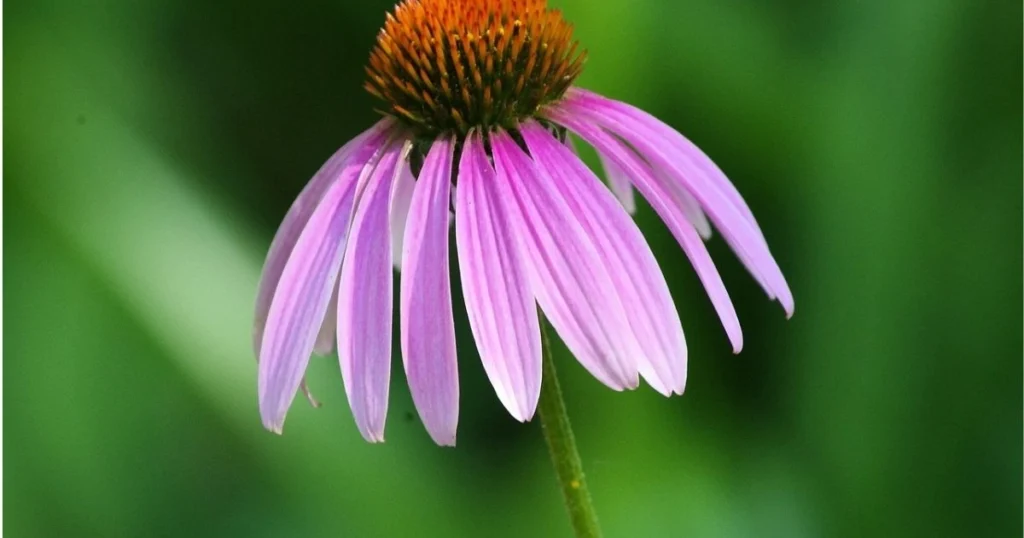
90. Purple Heart
- Plant Type: Perennial
- Geographic Origin: Mexico, Central America
- Plant Size: 1-2 feet tall
- Sun Exposure: Partial to full sun
Description: Purple Heart is known for its deep purple leaves with occasional small flowers. It makes a bold statement in garden borders or as a container plant.
Growing Tips: Prefers partial to full sun and well-drained soil. Water moderately and prune back to maintain its shape.
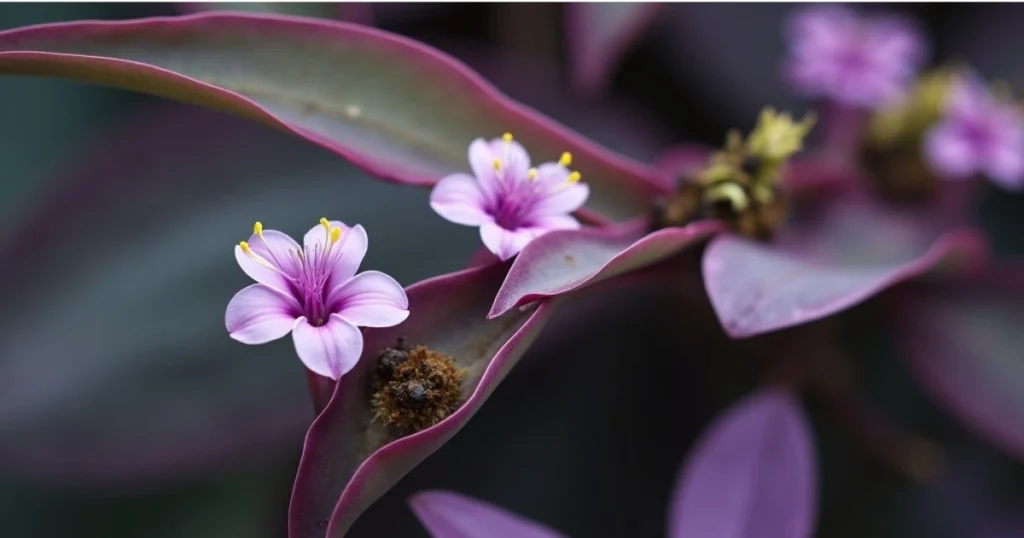
91. Red Clover
Plant Type: Perennial
Geographic Origin: Europe, North America
Plant Size: 1-2 feet tall
Sun Exposure: Full sun
Description: Red Clover features clustered, purple-red flowers with a sweet scent, attracting pollinators like bees and butterflies. It’s commonly found in meadows and pastures.
Growing Tips: Prefers full sun and well-drained soil. Tolerates drought and poor soil, but benefits from regular watering during dry spells.
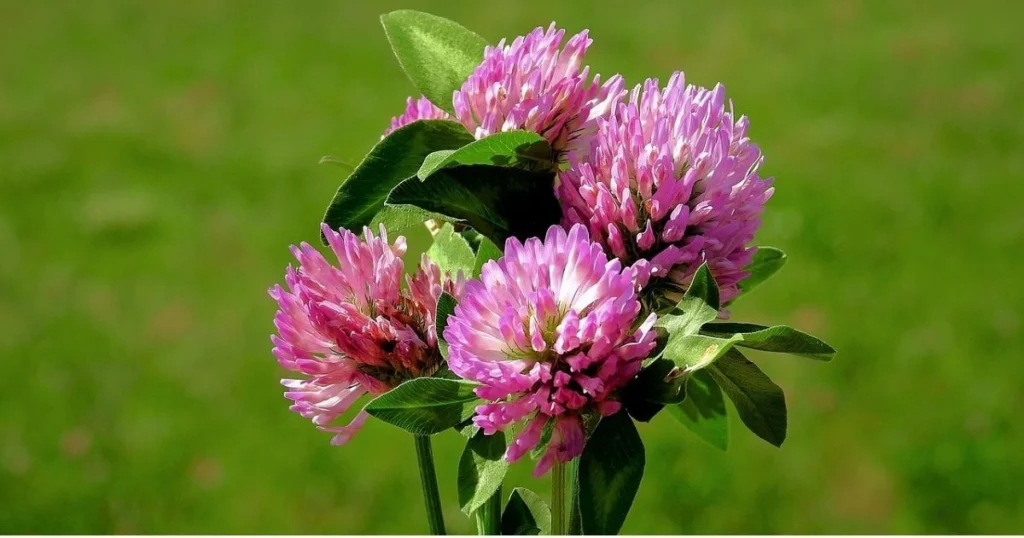
92. Russian Sage
Plant Type: Perennial
Geographic Origin: Central Asia
Plant Size: 3-4 feet tall
Sun Exposure: Full sun
Description: Russian Sage has silvery foliage with spiky purple blooms, adding a soft, airy look to gardens. It’s perfect for xeriscaping and attracts pollinators.
Growing Tips: Prefers full sun and well-drained soil. Drought-tolerant once established, it thrives with minimal maintenance.
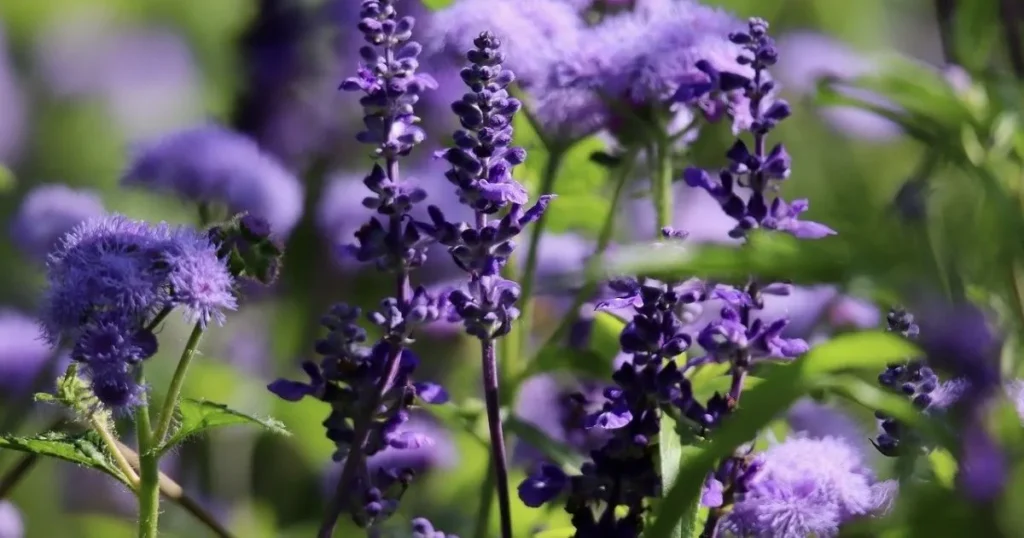
93. Salvia
Plant Type: Perennial
Geographic Origin: Mediterranean
Plant Size: 1-3 feet tall
Sun Exposure: Full sun
Description: Salvia produces tall spikes of purple flowers that attract pollinators like bees and hummingbirds. Its fragrant leaves enhance the scent of the garden.
Growing Tips: Prefers full sun and well-drained soil. Once established, it is drought-tolerant and benefits from regular pruning.
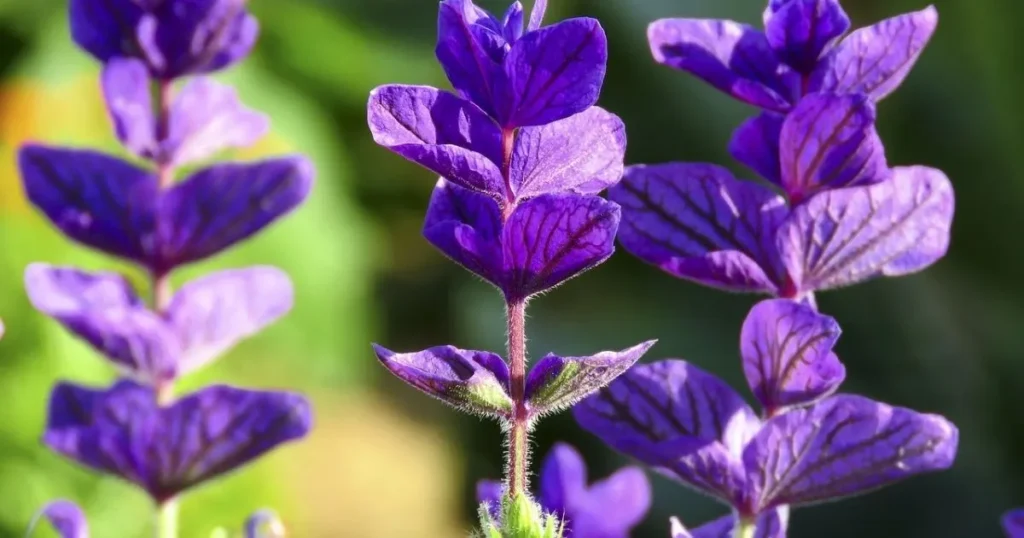
94. Sea Lavender
Plant Type: Perennial
Geographic Origin: Europe, Asia
Plant Size: 1-2 feet tall
Sun Exposure: Full sun
Description: Sea Lavender features small purple flowers that resemble sprigs of lavender, making it an excellent choice for coastal gardens.
Growing Tips: Prefers full sun and well-drained soil. Tolerates dry conditions and benefits from occasional deadheading to promote new growth.
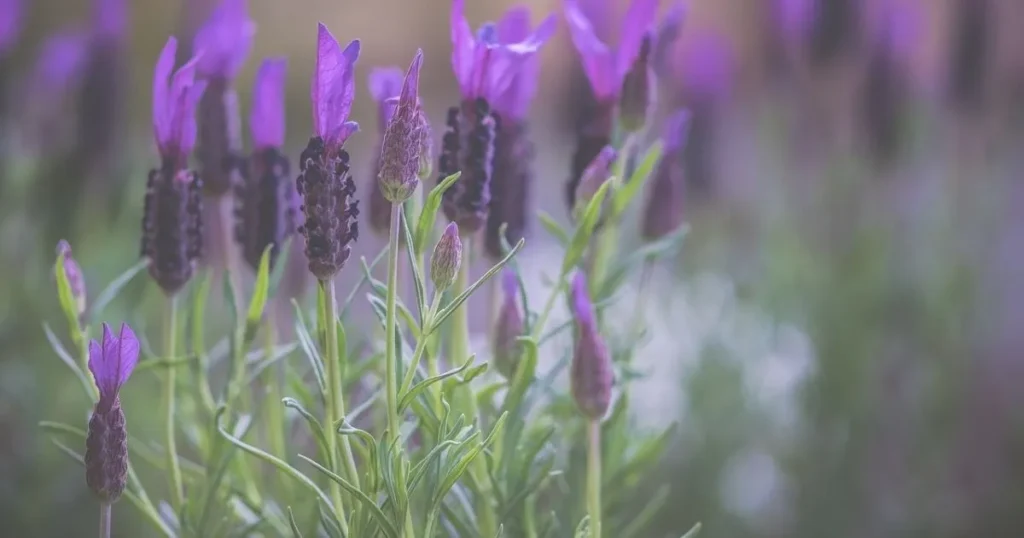
95. Siberian Iris
Plant Type: Perennial
Geographic Origin: Europe, Asia
Plant Size: 2-3 feet tall
Sun Exposure: Full sun
Description: Siberian Iris showcases elegant purple flowers with intricate petals, adding sophistication to any garden. It thrives in moist, well-drained soils.
Growing Tips: Prefers full sun and well-drained soil. Consistent watering is important, particularly during dry spells.
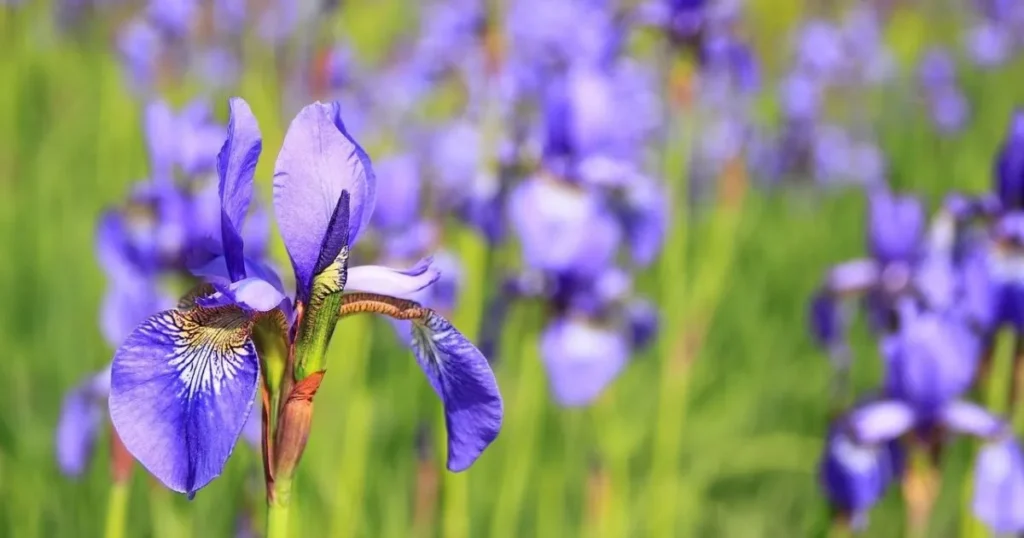
96. Speedwell
Plant Type: Perennial
Geographic Origin: Europe,
AsiaPlant Size: 1-2 feet tal
lSun Exposure: Full sun
Description: Speedwell features small purple flowers with a delicate appearance, often used in border gardens or as ground cover.
Growing Tips: Prefers full sun and well-drained soil. Tolerates dry conditions and is low-maintenance once established.
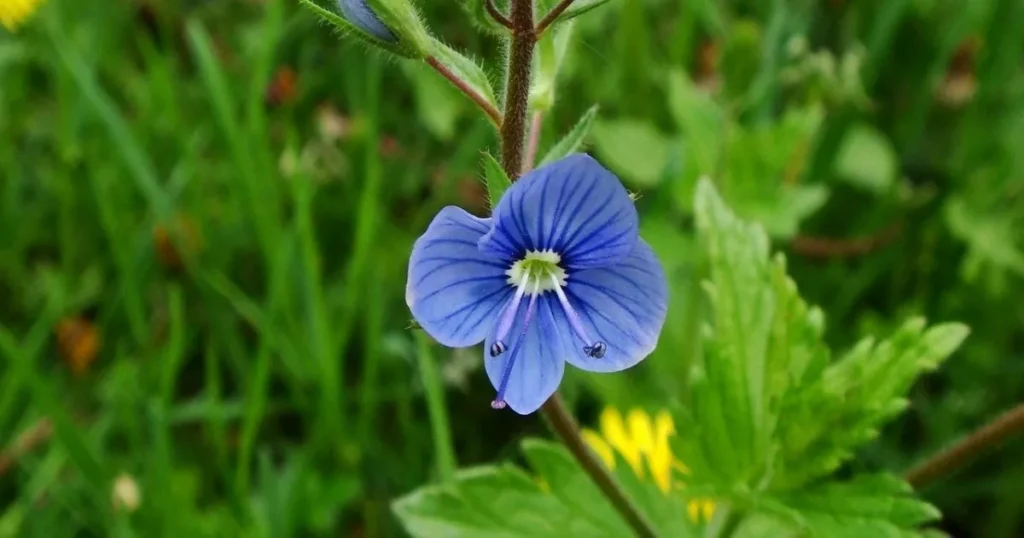
97. Spiderwort
Plant Type: Perennial
Geographic Origin: North America
Plant Size: 1-3 feet tall
Sun Exposure: Full sun
Description: Spiderwort has small purple flowers that bloom in clusters, attracting pollinators and adding vibrant color to gardens.
Growing Tips: Prefers full sun and well-drained soil. It benefits from regular watering but can tolerate some drought once established.
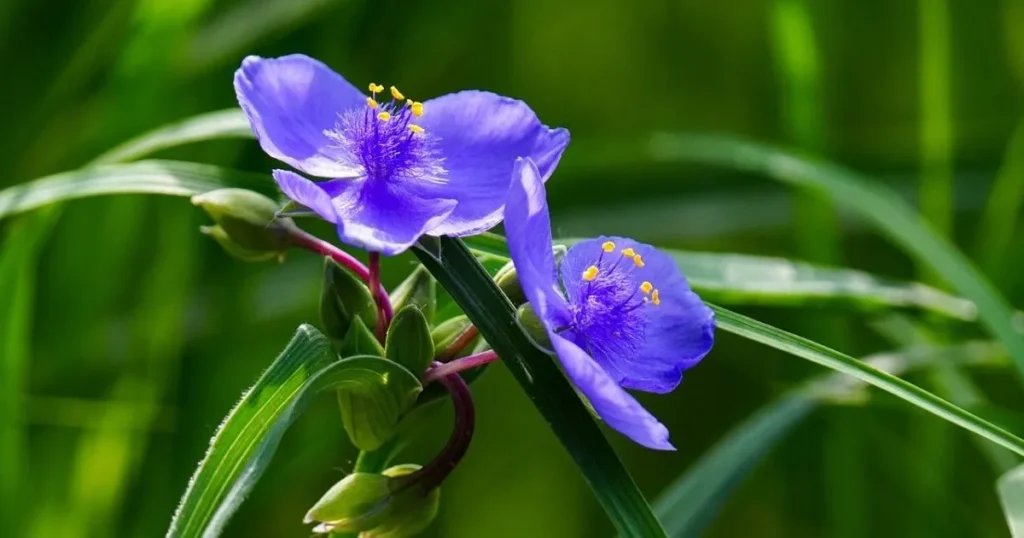
98. Statice
Plant Type: Perennial
Geographic Origin: Mediterranean
Plant Size: 1-2 feet tall
Sun Exposure: Full sun
Description: Statice offers dryable flowers in shades of purple, making it popular in dried arrangements and bouquets.
Growing Tips: Prefers full sun and well-drained soil. Once established, it requires minimal water and is drought-tolerant.
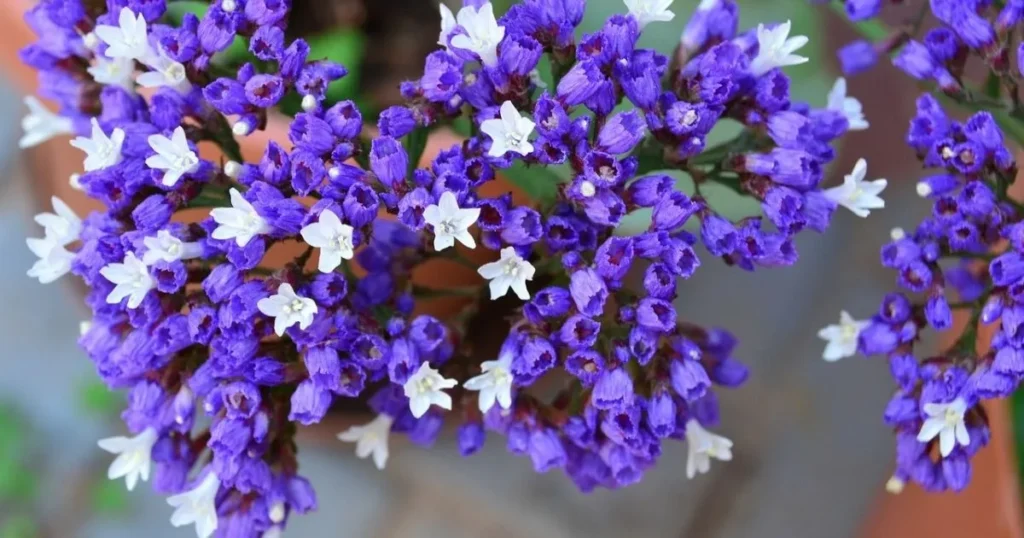
99. Sweet Potato Vine
Plant Type: Perennial
Geographic Origin: Central America
Plant Size: Varies, ground cover
Sun Exposure: Full sun
Description: Sweet Potato Vine features purple, heart-shaped leaves that add a striking contrast to gardens and hanging baskets.
Growing Tips: Prefers full sun and well-drained soil. It thrives in warm conditions and benefits from regular watering during dry spells.
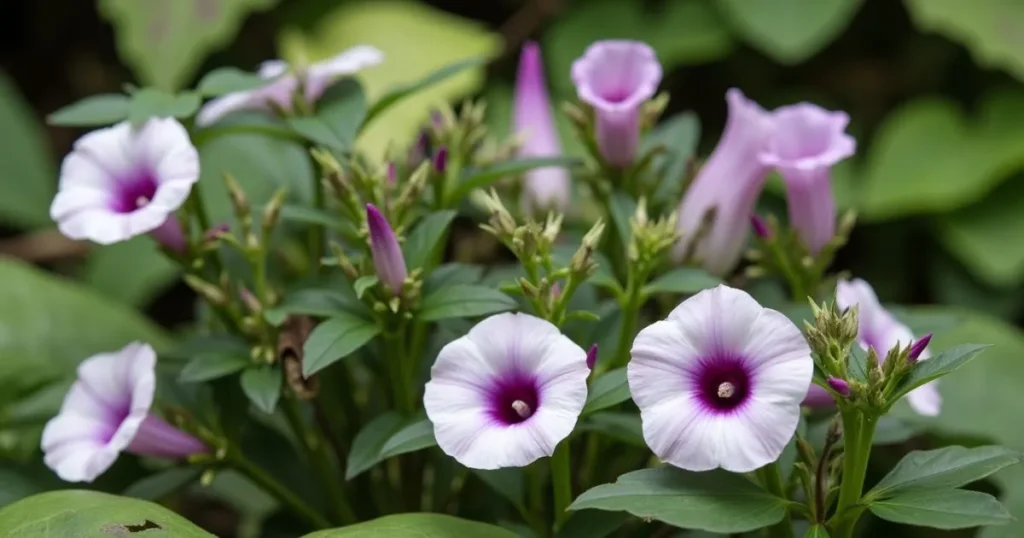
100. Verbena
Plant Type: Perennial
Geographic Origin: South America
Plant Size: 1-2 feet tall
Sun Exposure: Full sun
Description: Verbena produces small clusters of purple flowers, making it a popular choice for hanging baskets and container gardens.
Growing Tips: Prefers full sun and well-drained soil. Tolerates dry conditions and is a low-maintenance plant.
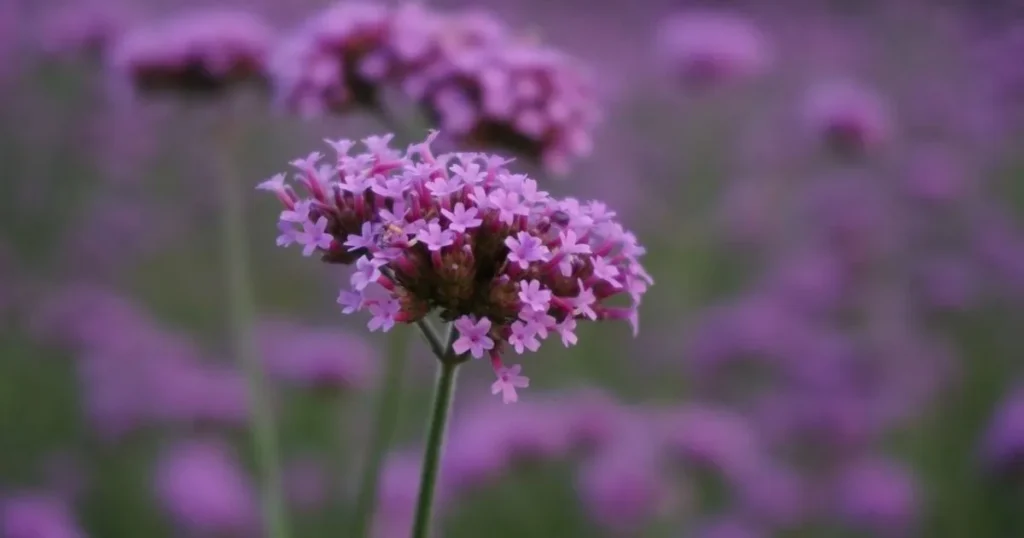
101. Wisteria
Plant Type: Deciduous Vine
Geographic Origin: Eastern Asia, North America
Plant Size: 10-30 feet tall
Sun Exposure: Full sun
Description: Wisteria has cascading clusters of purple flowers, making it a stunning addition to trellises, pergolas, and fences.
Growing Tips: Prefers full sun and well-drained soil. It requires support structures and benefits from annual pruning to maintain shape and encourage blooming.
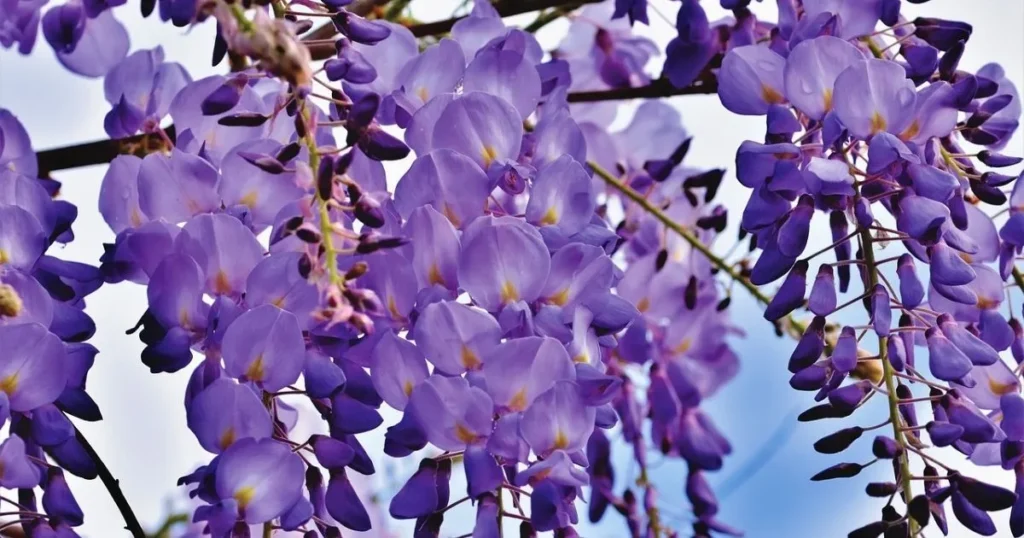
Tips for Growing and Caring for Purple Flowers
Choosing the Right Purple Flowers for Your Space
Not all flowers thrive in every environment. When selecting your blooms, consider these factors:
- Climate: Does your region experience harsh winters or mild, sunny days?
- Soil Type: Sandy, loamy, or clay soils affect how your plants grow.
- Sunlight: Some flowers prefer full sun, while others thrive in partial shade.
Planting and Maintenance Tips
- Prepare the Soil: Enrich it with organic compost to ensure proper drainage and nutrients.
- Water Wisely: Avoid overwatering; most purple flowers prefer moderate moisture.
- Prune Regularly: Deadheading encourages more blooms and keeps plants healthy.
Arranging Purple Flowers in Your Garden
- Color Pairings:
- Purple with white creates an elegant and serene garden.
- Purple with yellow adds vibrant contrast.
- Purple with pink brings a soft and romantic touch.
- Design Ideas:
- Use purple flowers to line pathways or as borders.
- Group them in clusters for a bold, dramatic look.
- Incorporate them into wildflower meadows for a naturalistic vibe.
FAQs About Purple Flowers
What is the most popular purple flower?
Lavender is one of the most popular purple flowers, loved for its fragrance, versatility, and calming properties.
Are there any purple flowers that bloom year-round?
While no flower blooms continuously year-round, perennials like violets and certain types of clematis have extended bloom periods.
How can I make my purple flowers bloom longer?
Proper care, including regular deadheading, adequate sunlight, and balanced fertilization, can extend the blooming season.
Conclusion
Purple flowers are more than just beautiful additions to your garden—they bring elegance, attract wildlife, and inspire tranquility. Whether you’re planting annuals for a splash of seasonal color or cultivating perennials for long-lasting charm, there’s a purple flower for every garden and every gardener.
As you explore the world of these stunning blooms, remember to experiment with arrangements, care techniques, and companion plants. Let your garden reflect your creativity and personality.
So, which purple flowers will you plant first? Share your gardening journey and favorite blooms in the comments below. Happy gardening!
Call-to-Action: If you found this guide helpful, don’t forget to bookmark it for future reference. Share it with friends who love gardening, and subscribe to our newsletter for more tips, tricks, and flower inspirations!
